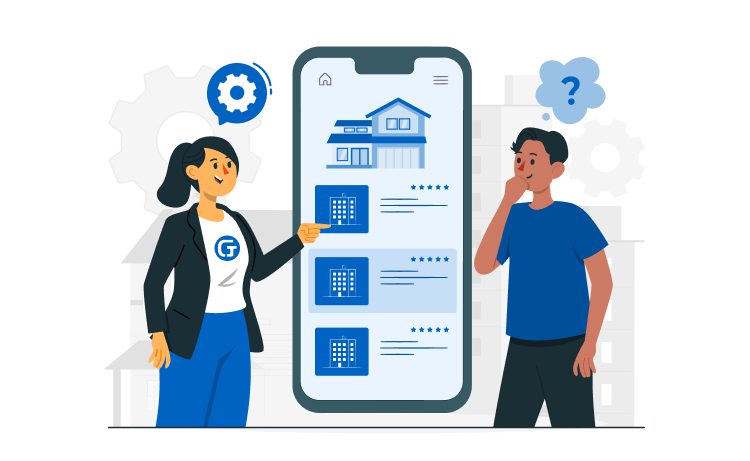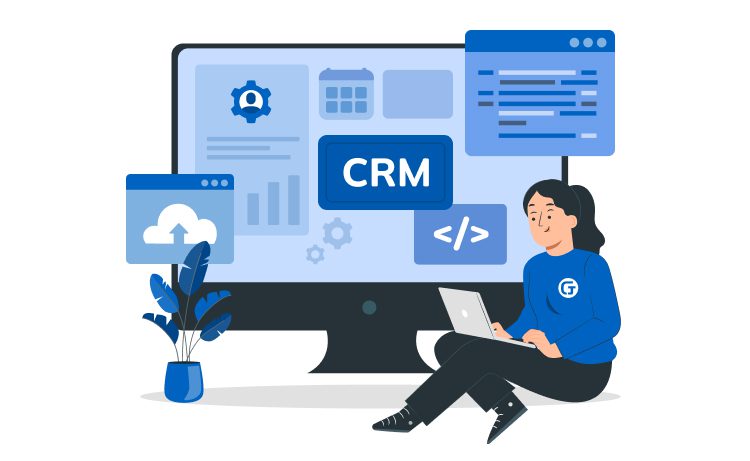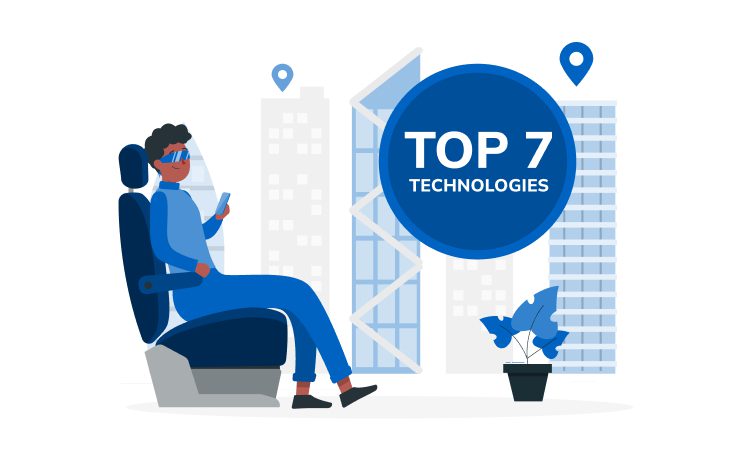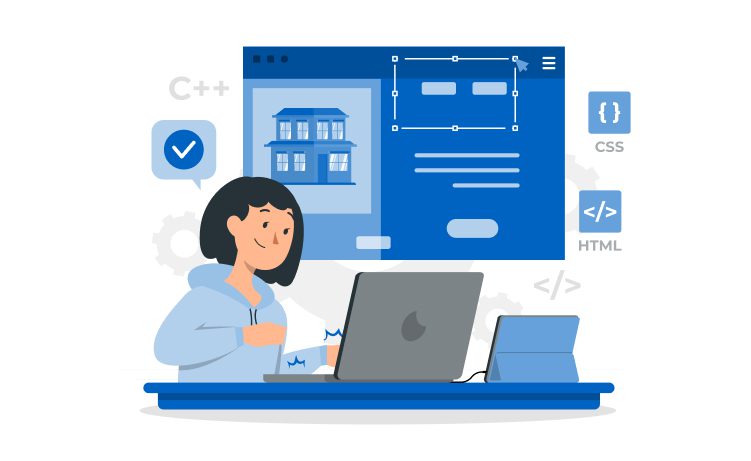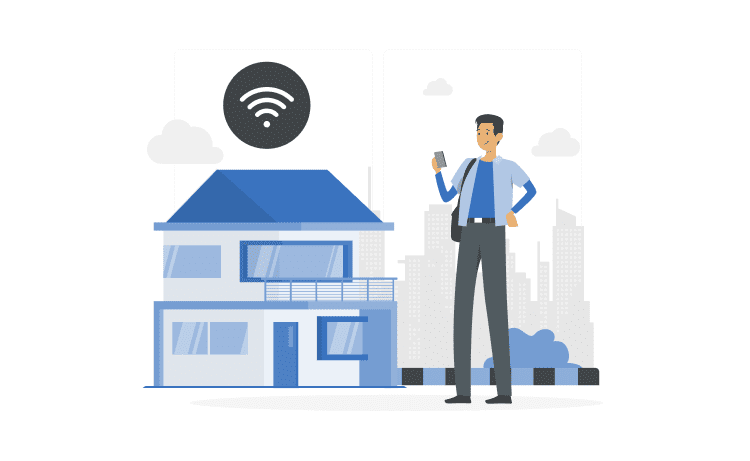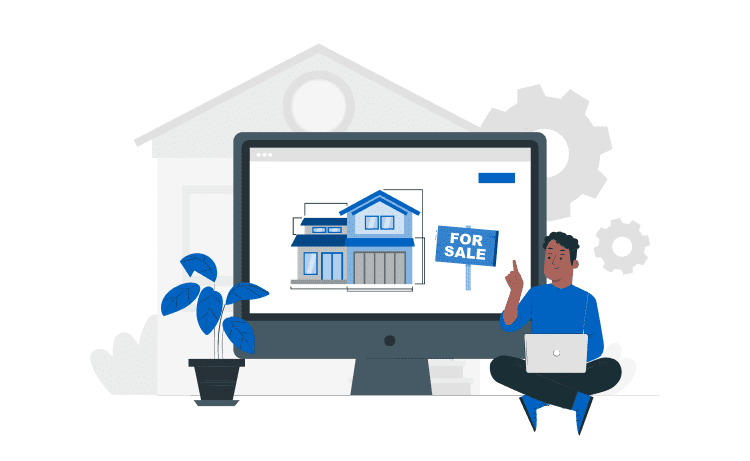
Guide to Real Estate App Development: Functions, Processes, and Costs



In 1981, people were looking for real estate agents in newspaper ads, according to the National Homebuying Survey. Today, 97% of homebuyers search the Internet for a house. Connecting with a real estate agent, finding a suitable home, and comparing details has never been easier than today.
Thanks to smartphones, real estate app development, and technological progress, we can combine two of the most solid industries thriving even during the recession.
Having a mobile phone in your pocket opens doors to many possibilities. And real estate business owners have quickly adopted these trends and changes to create the most comfortable experience for their customers.
This guide will teach you how to follow the flow of technological advancement and create your real estate app.
Content
With the rise of smartphones and tablets, consumers are increasingly turning to real estate mobile applications to search for properties, connect with agents, and streamline their buying or selling process. This shift in consumer behavior has led to a surge in real estate application development, as businesses strive to meet the evolving needs of their clients.
A real estate mobile app is software designed specifically for mobile devices such as smartphones and tablets to enable various aspects of the real estate industry. These mobile apps can serve multiple purposes for users and different real estate service providers.
You’ll often see these types of real estate apps:
Real estate mobile apps have three audiences: home buyers, sellers, and real estate agents. Each type seeks particular benefits in the real estate industry, such as easy online booking, search filters, effective property management, and more. We will break down these benefits in the table below.
| Benefits for buyers | Benefits for sellers | Benefits for Real Estate agents |
| Easy access to property details | Faster sales of real estate properties | All-in-one information hub |
| Customized search | Increase in market coverage | Daily task automation |
| Improved communication | User-friendly property listing presentation | Increase in market coverage |
| Single app for resolving all claims | Paperwork guidance | Effective client retention |
| Comparison tools that save time | Simplified listing of property details | Additional revenue stream |
| Advice on accompanying paperwork | Streamlined property management | Increased brand awareness |
Real estate app development is a multi-component process involving stakeholders, real estate app developers, UX designers, and more. Understanding the complexities involved and providing tailored app and web development solutions can result in successful real estate apps that deliver a seamless experience for buyers, sellers, and real estate professionals in the dynamic real estate field.
Let’s dive into a step-by-step guide on creating a real estate mobile app from research to launch.
You already have an idea for your app, but we’re still far from the real estate mobile app development process. First, we must consider the environment, supply, and demand and conduct thorough real estate sector research.
Research helps to determine the following:
The real estate industry tech scene is vast with various solution options. The specifics of this industry are little to no restrictions and compliances. Yes, we should follow the personal data protection principles, but other than that, real estate industry has no limitations. That gives room for creativity.
So the goal of the initial project implementation phase, which is discovery, is to understand expectations for the future solution, mainly what needs to be covered by it and for what audience. If required, we initiate audience research or customer interviews. Based on this knowledge, we choose the most appropriate format and develop an implementation roadmap.
Anna VoznaClient Success Manager, Glorium Technologies
After successful research, you can incorporate audience’s needs into your real estate web application, ensuring it caters to the specific demands of the real estate audience. You can proceed to the next step.
Real estate mobile application development is a complex process that requires expertise in both technology and the real estate field. Understanding the industry and audience will give you extensive information about your customers’ needs, which you can use when choosing your app’s features. Here’s a little cheat sheet on selecting features:
To learn more about choosing your real estate mobile app development and its’ features, read our eBook: “Top 7 Technologies for Improving Customer Experience in Real Estate through Digitization” or find more information in the web conference recordings: “Digital Transformation in Real Estate”
Once you approve the concept, you can choose the tech for your real estate application development. Use external databases through third-party APIs to avoid running on a dedicated server that hosts all the information you need. An API (or application programming interface) stands for several rules for communicating between databases. APIs may provide data about offers and display them in a mobile or web application. When embarking on a real estate application development project, it’s essential to partner with experienced real estate mobile app developers who understand the unique challenges and opportunities within the industry.
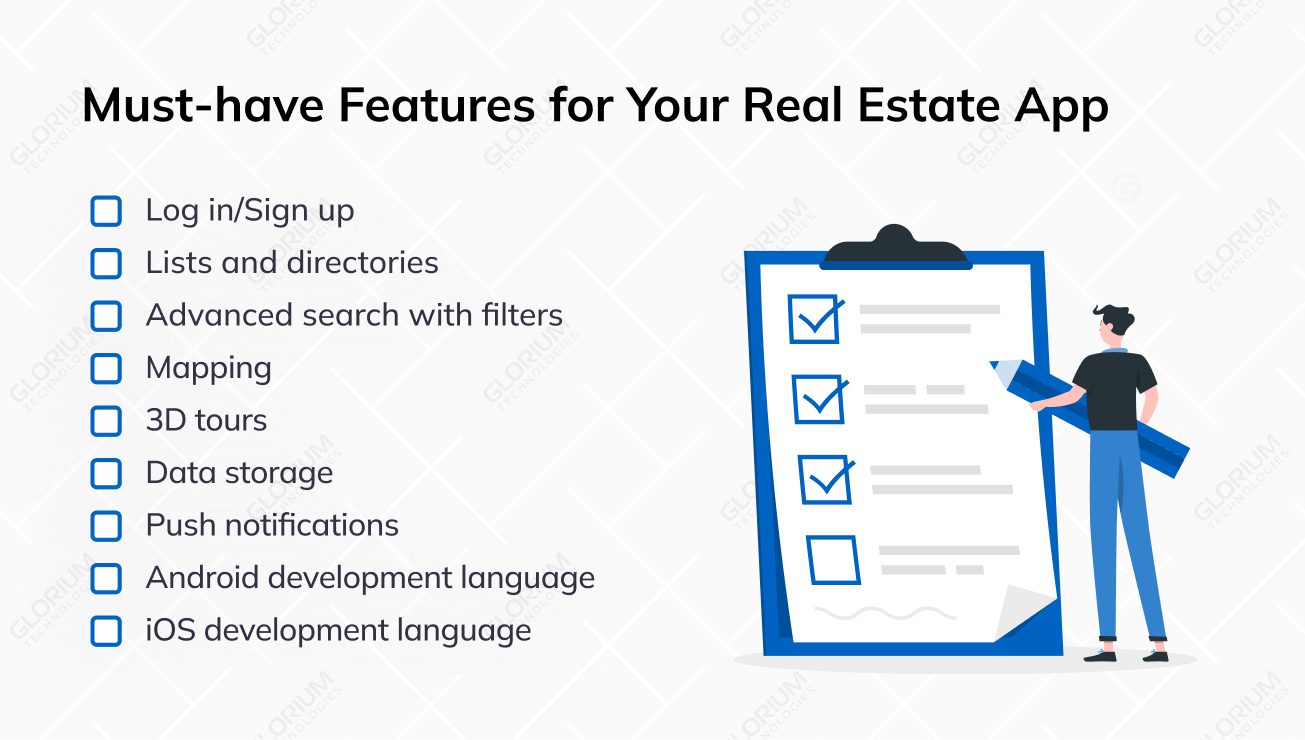
Here are several features that require different technology stacks when developing online housing platforms:
While the same technologies can be utilized for developing solutions for various industries, the type of issues to solve differs. In the real estate industry, it is more about algorithmic and computational tasks. So it comes naturally that experts with relevant backgrounds will perform better. That is why at Glorium Technologies, we adhere to the principle of developing the hands-on industry-related expertise of our engineers.
Anna VoznaClient Success Manager, Glorium Technologies
The app’s functionality is essential, but the design helps customers decide whether to delete or keep the app.
Below are specific trends and real estate app development solutions to include in your real estate application development so your customers can enjoy a unique experience.
Simple interface. The service should be simple, user-friendly, and accessible to everyone.
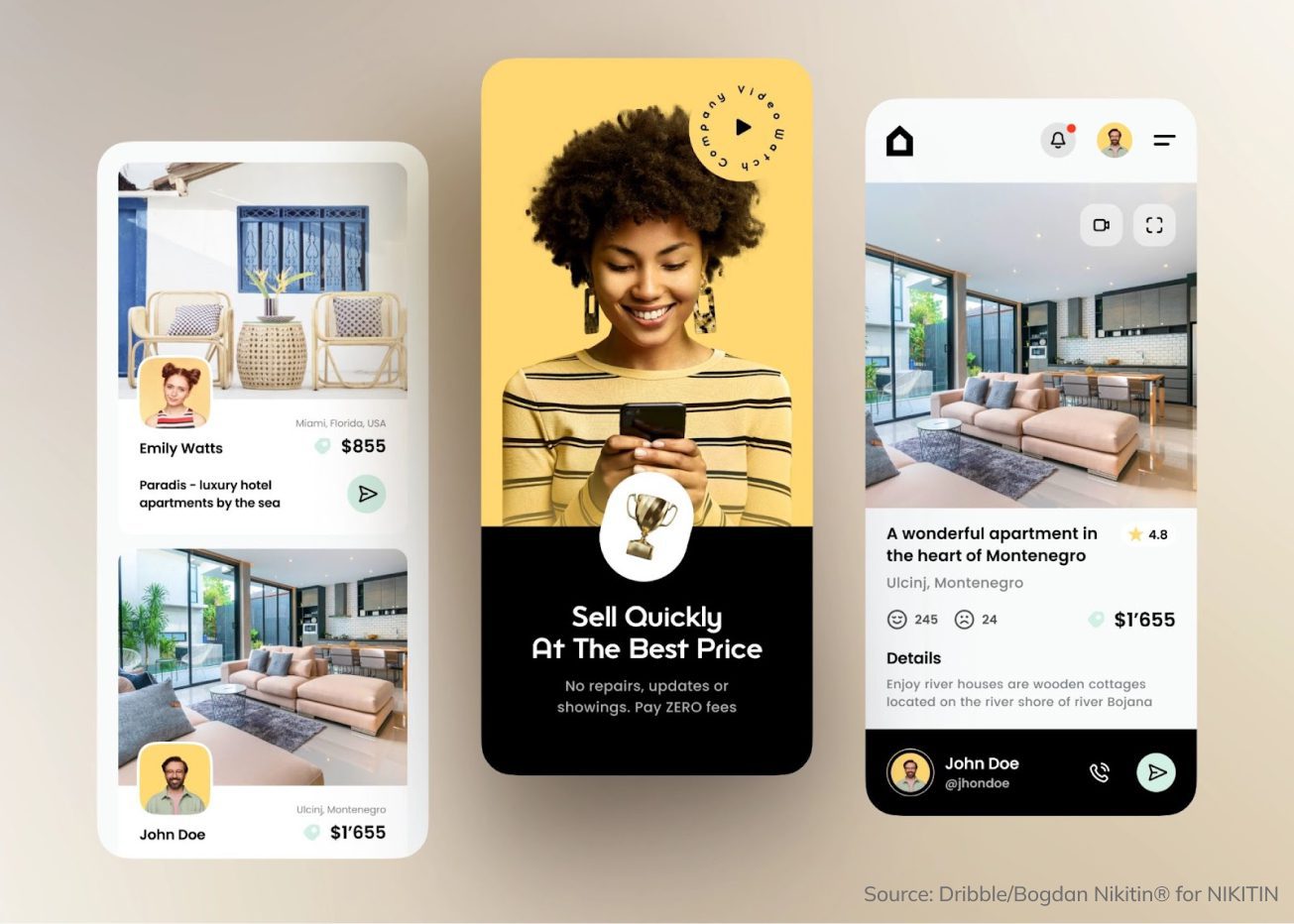
Easy navigation. Refrain from overcomplicating navigation with clunky menus. But don’t reject it altogether. The menu should be as thought-out and concise as possible.
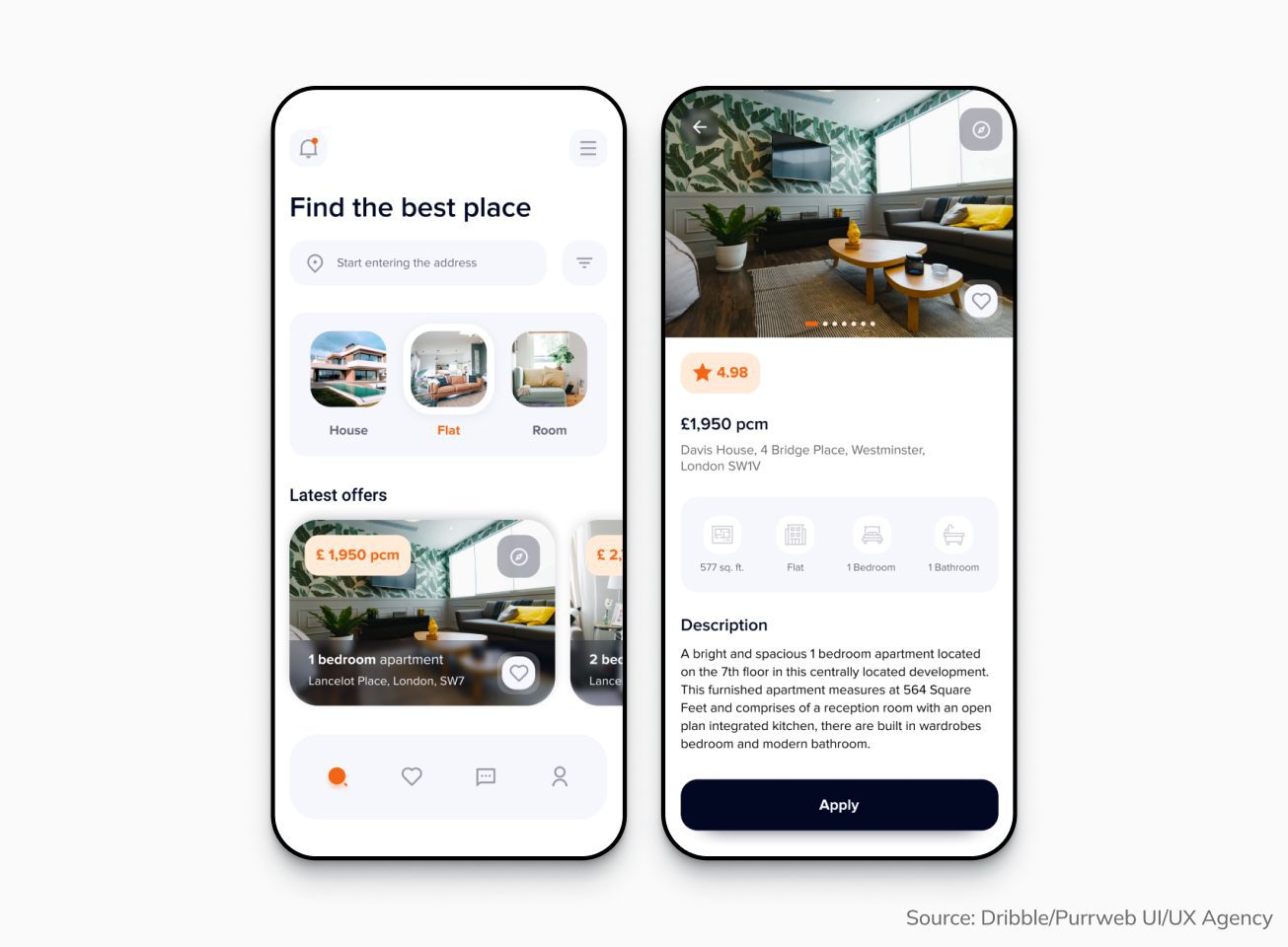
Simple backgrounds. Mobile designers create monochrome or blurry experiences that make the app’s navigation and features more expressive. This also reduces loading time and makes user interaction more comfortable.
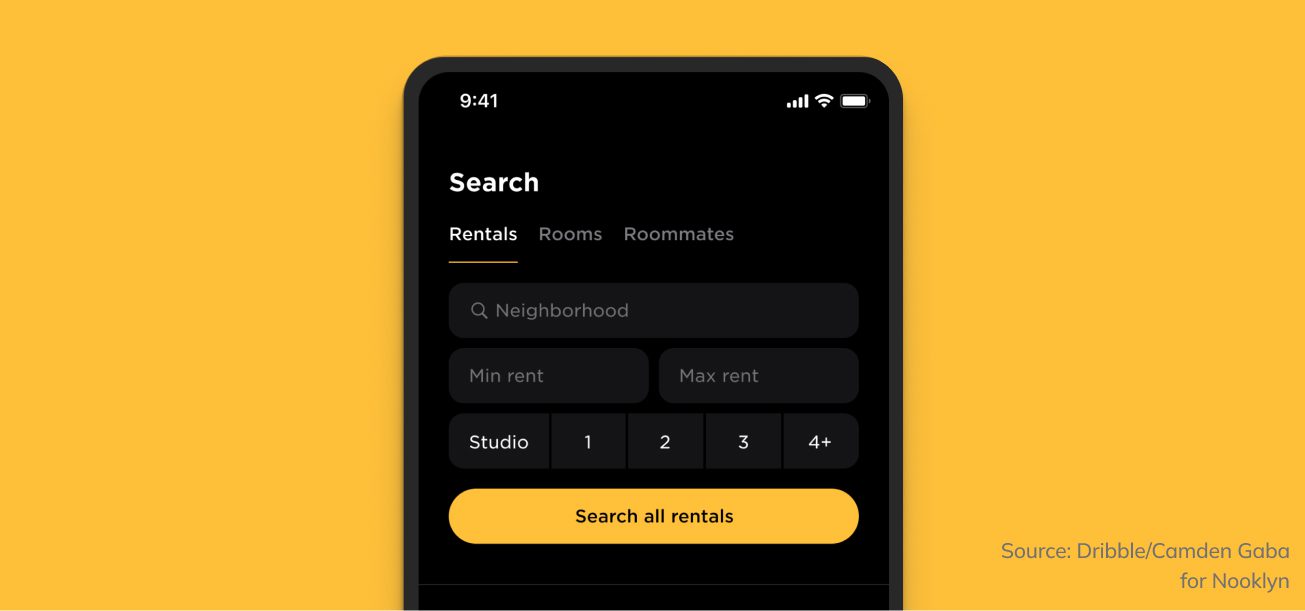
Cross-page feature. The cross-page feature ensures greater user interest and engagement. This solution has a higher effect on further SEO optimization. You can also integrate analytics tools. This allows analyzing pages and information to keep improving them.
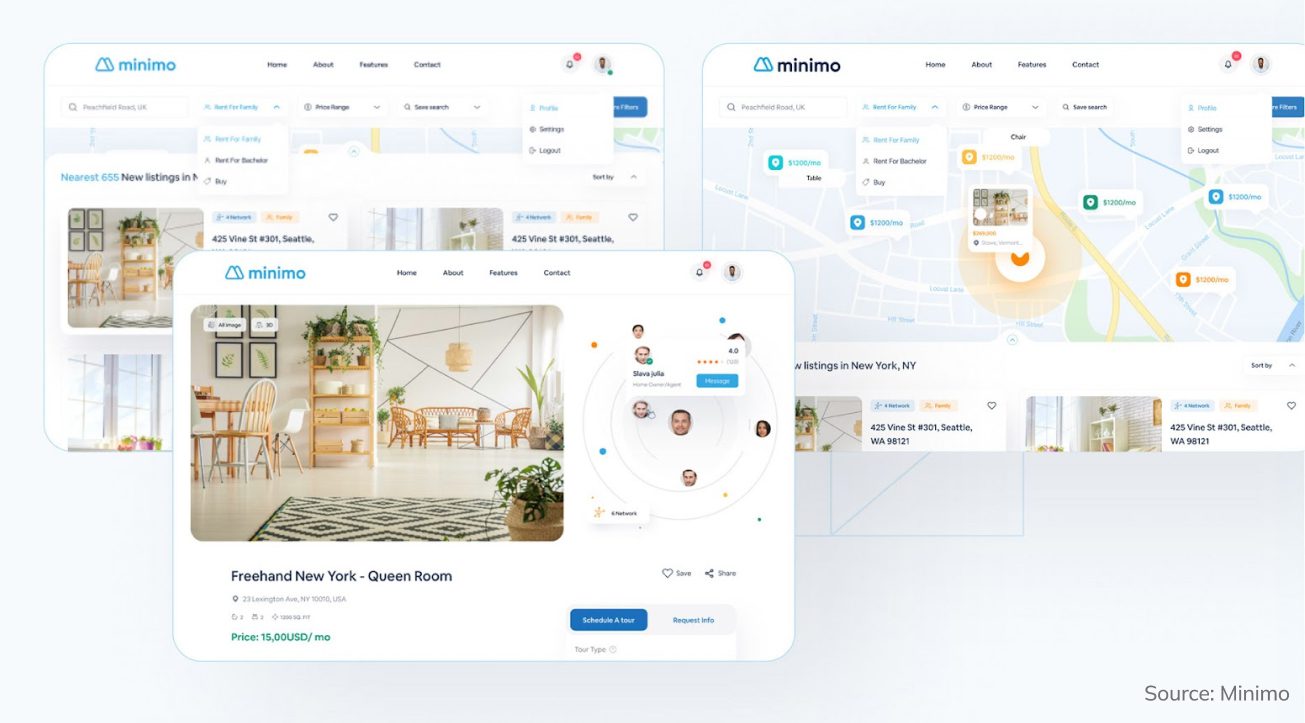
Dark mode. This model has become the new standard for users. Studies show that 87% of smartphone users use their phones every evening for an hour before bed. So, it should be possible to set a dark mode as the interface style.
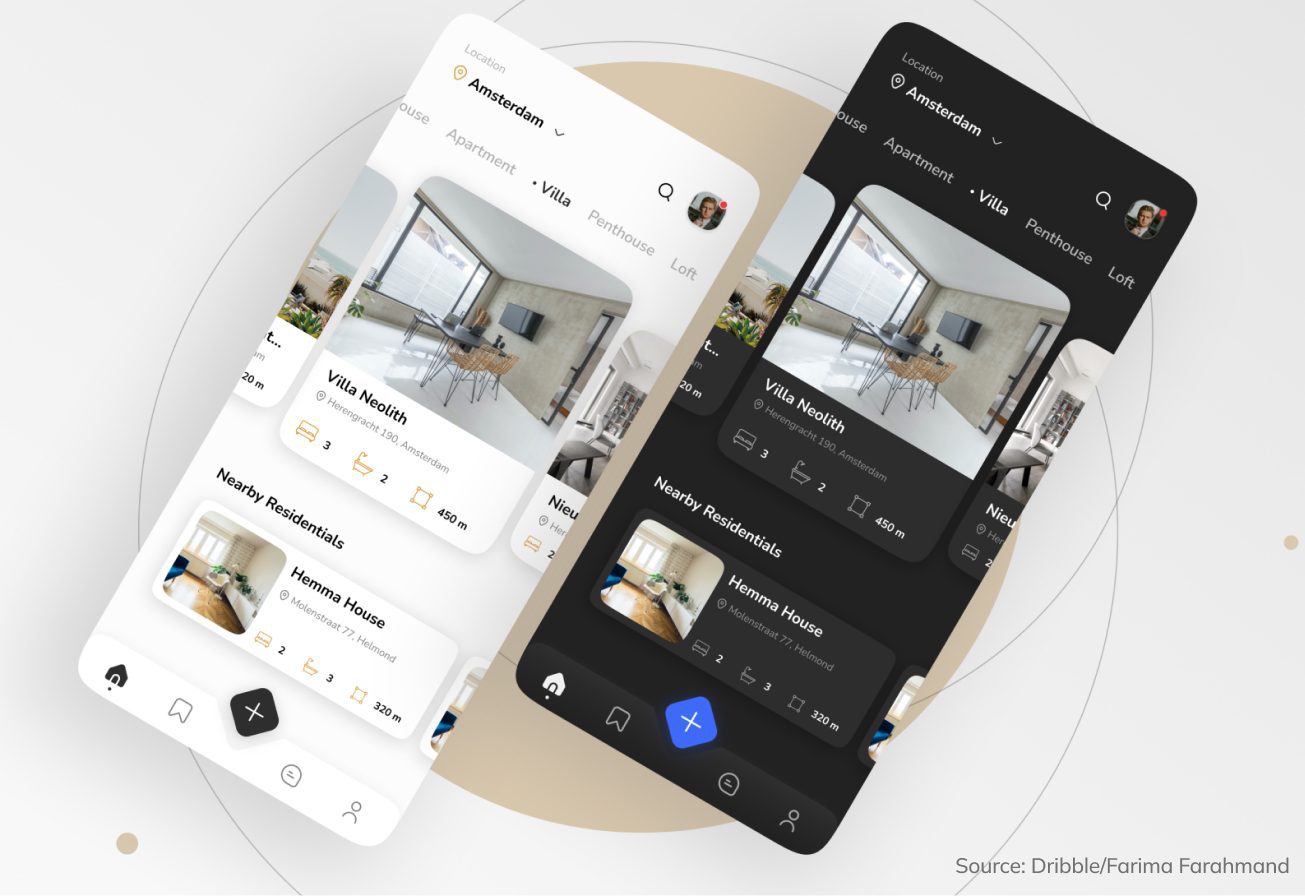
Design optimization. 70% of app installs come from search queries. How an app appears in search greatly impacts its popularity. Choose a color scheme, header style, navigation mode, launch screen, and other popular design elements carefully.
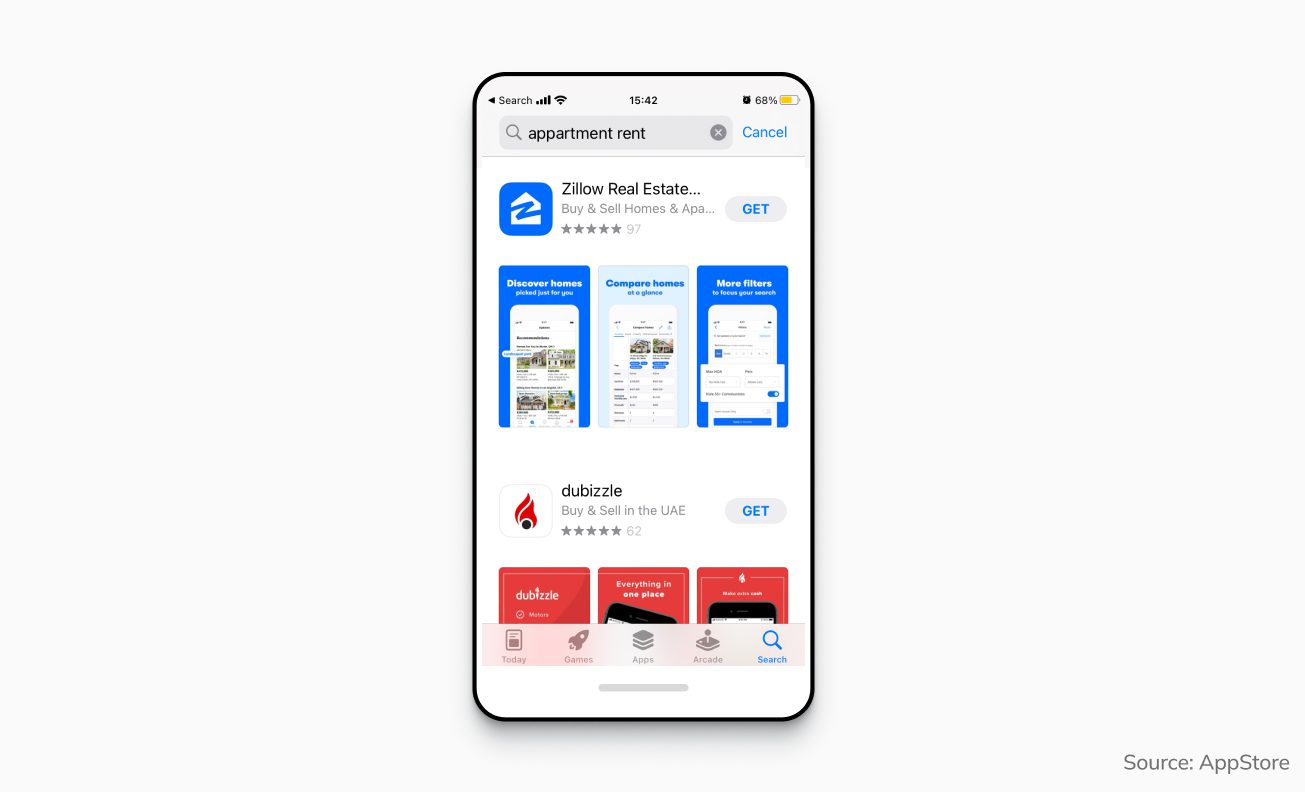
The three-click rule. This is an unofficial rule of website navigation. It implies that the user should find anything in less than three clicks in effective real estate mobile applications.
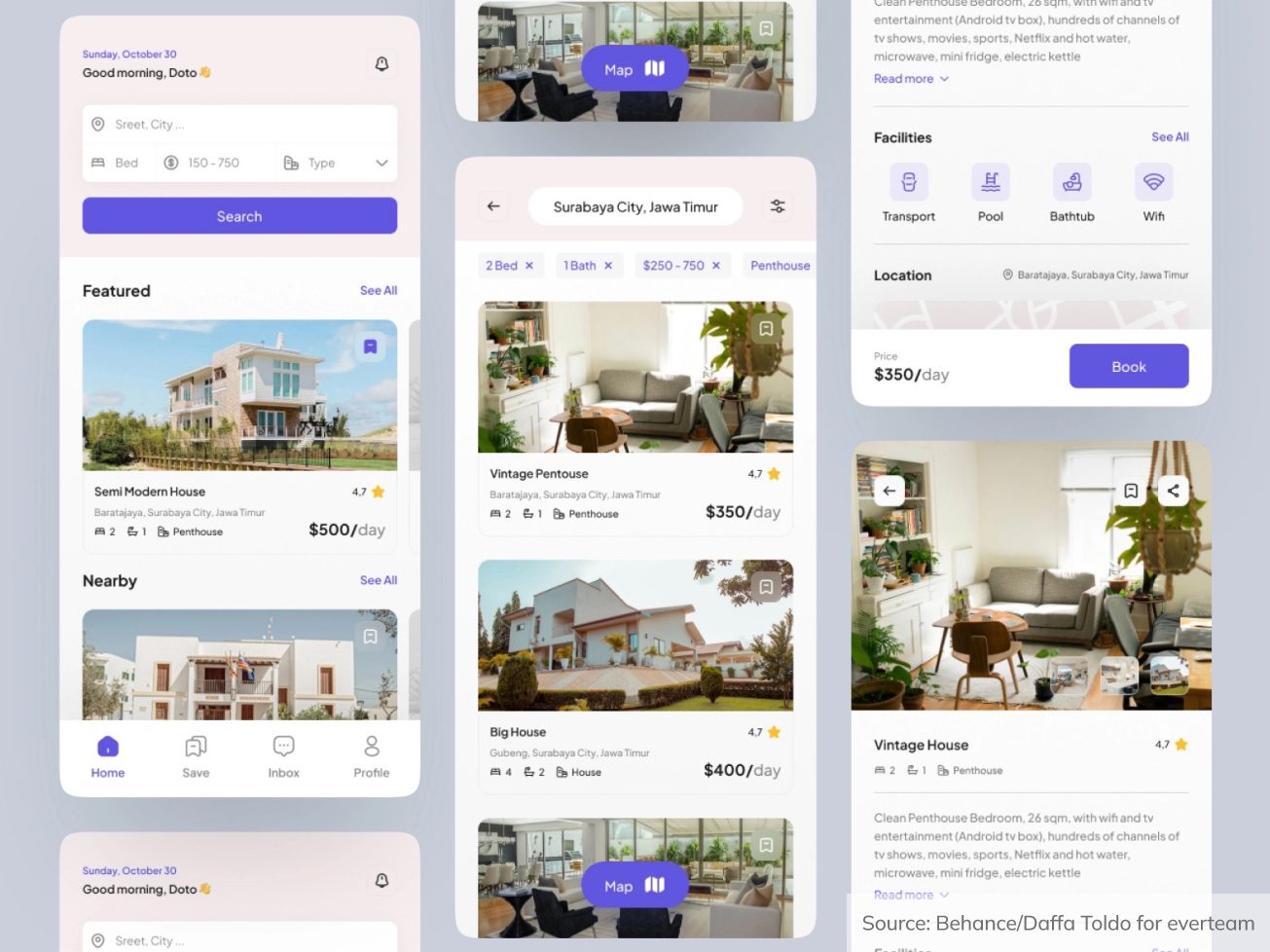
Swiping gestures. Smartphone users have typical swiping gestures. Analyzing this information will come in handy in your real estate mobile app development. UX designers often include swiping gestures as parts of the design.
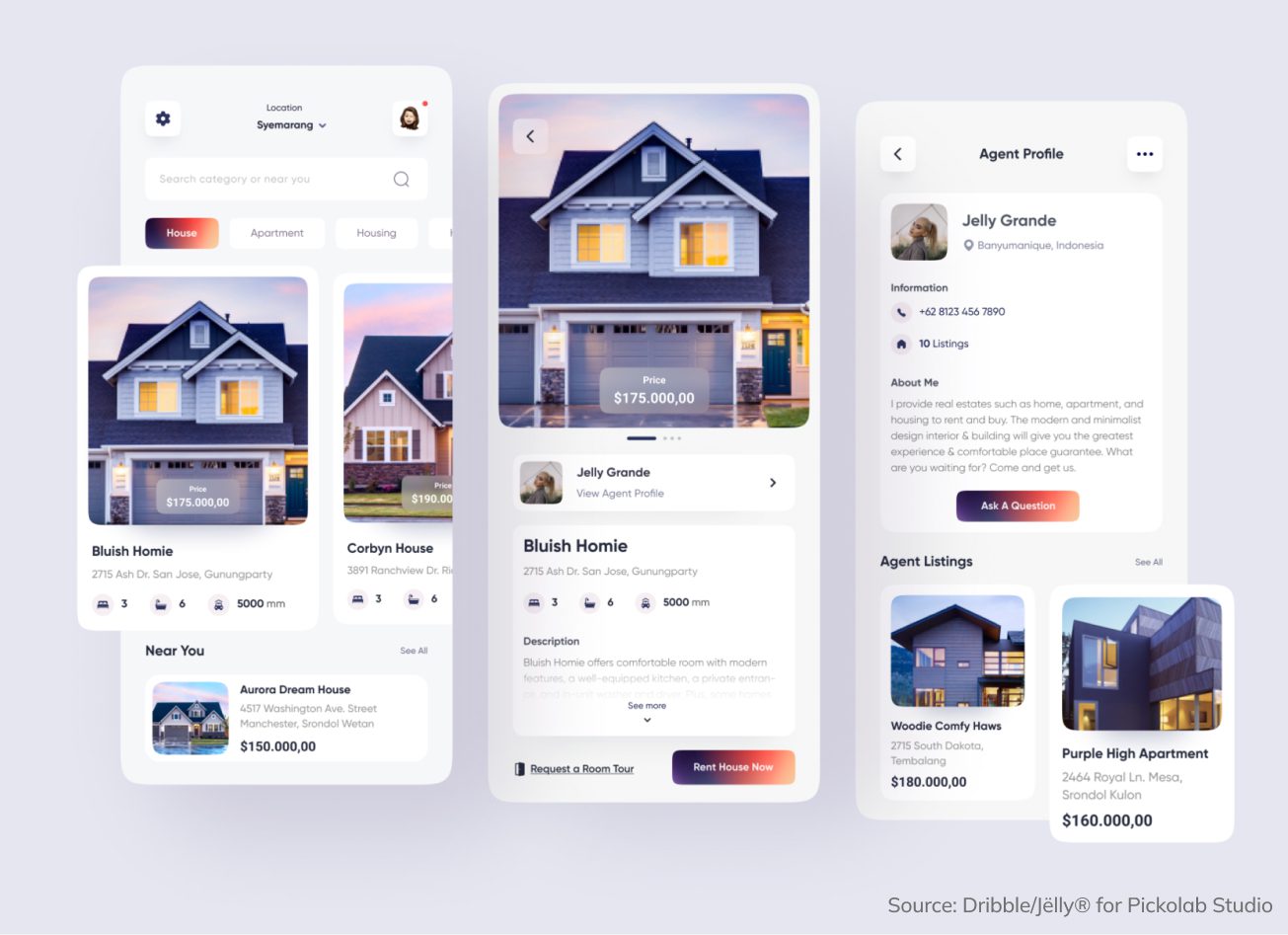
Color palette. Design experts recommend using brand colors strategically. Colors can highlight important information and call-to-action buttons, setting the overall mood.
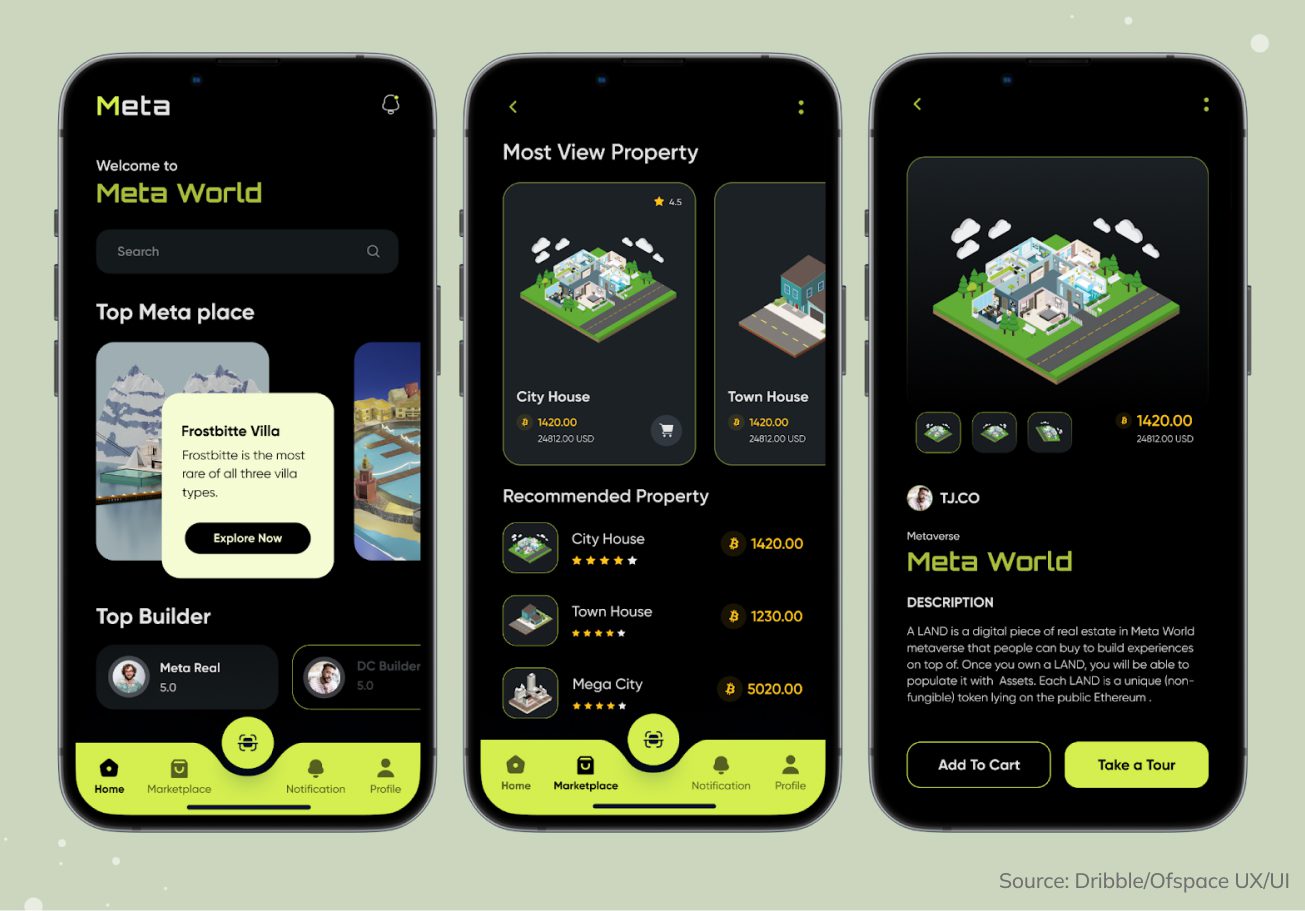
Gadgets we take with us. Consider creating a design for smartwatches and other gadgets besides mobile phones and tablets.
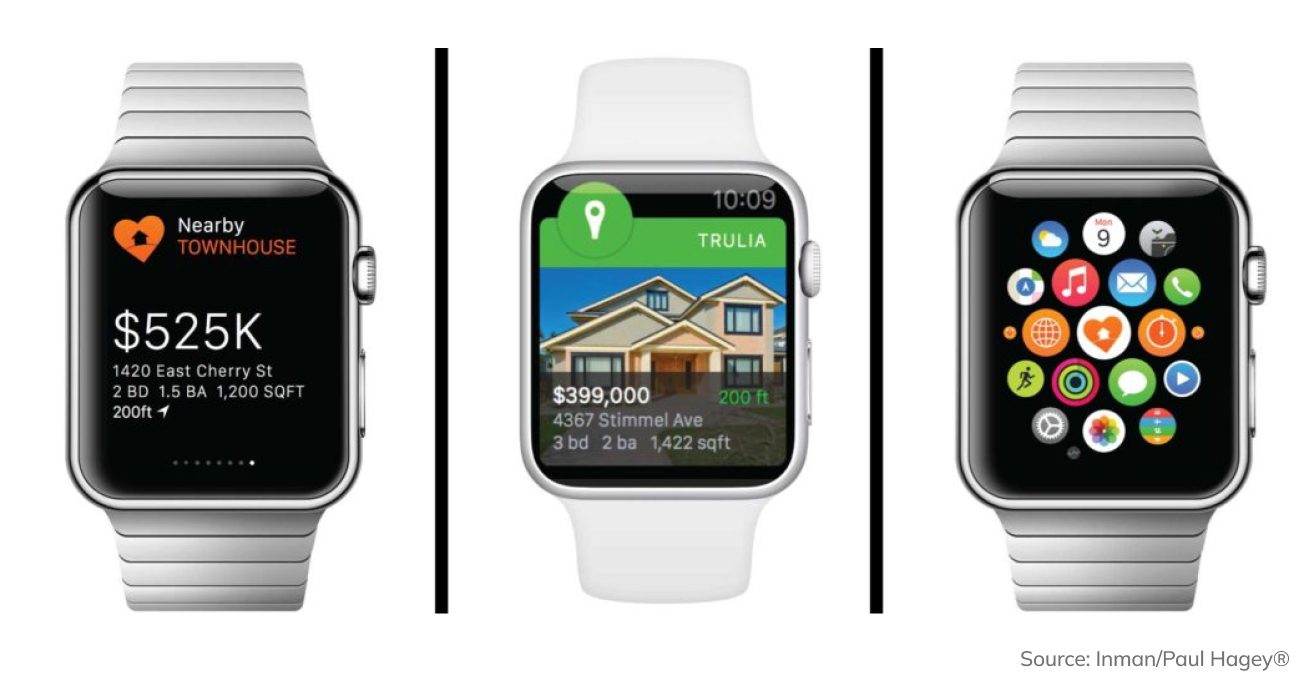
In a saturated real estate market, apps that prioritize simplicity and ease of use shine. Design with the user in mind, ensuring intuitive functionality and navigation for a seamless experience. An easy-to-understand app not only attracts users but also boosts engagement and loyalty.
The features listed below are a reasonable basis for a state-of-the-art app. When appropriately combined and framed in an intuitive user interface, these tools will bring in new visitors and likely turn them into potential customers.
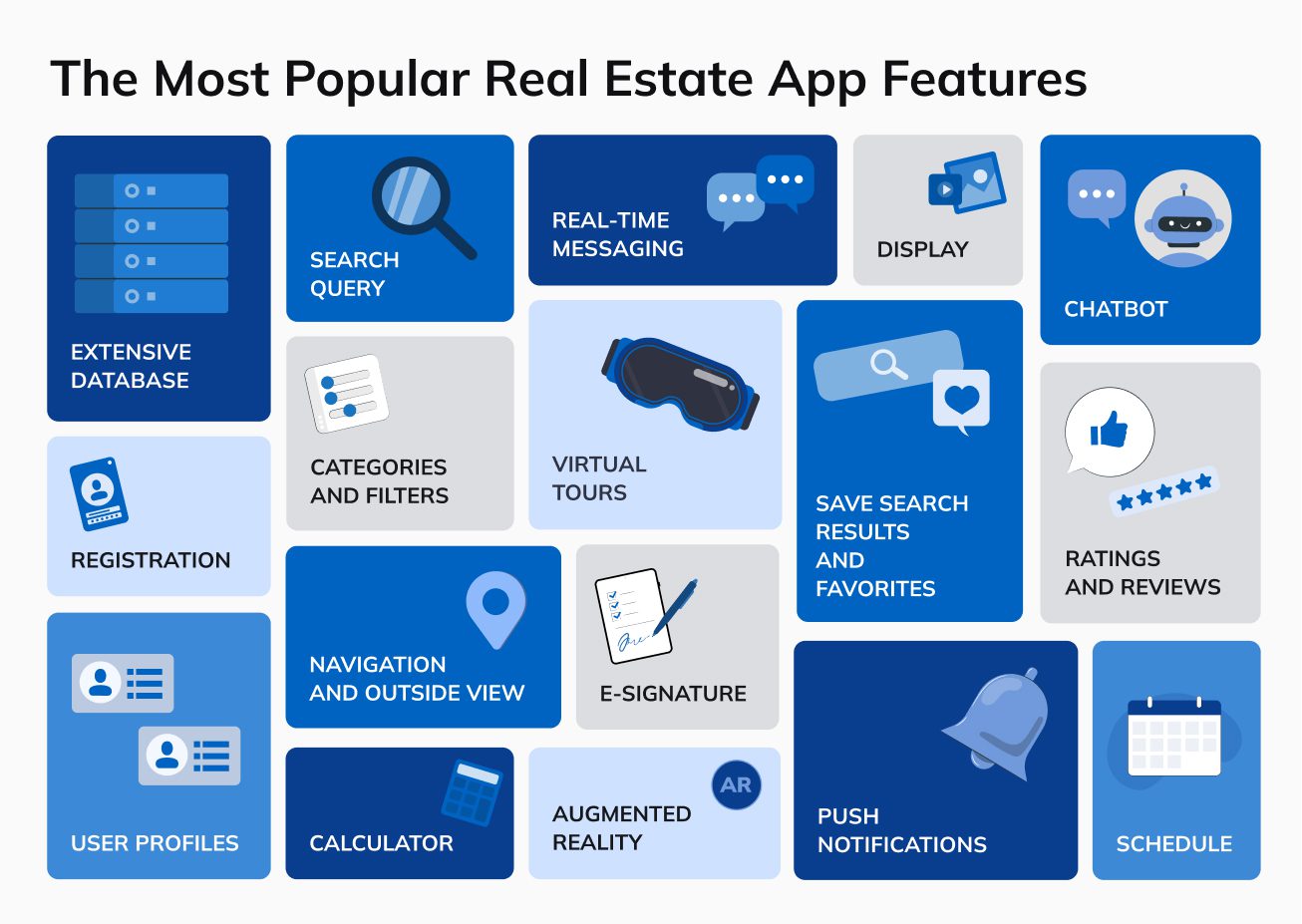
Extensive database. Application success relies on the database you add. The broader it is, the more chances it can reach the top.
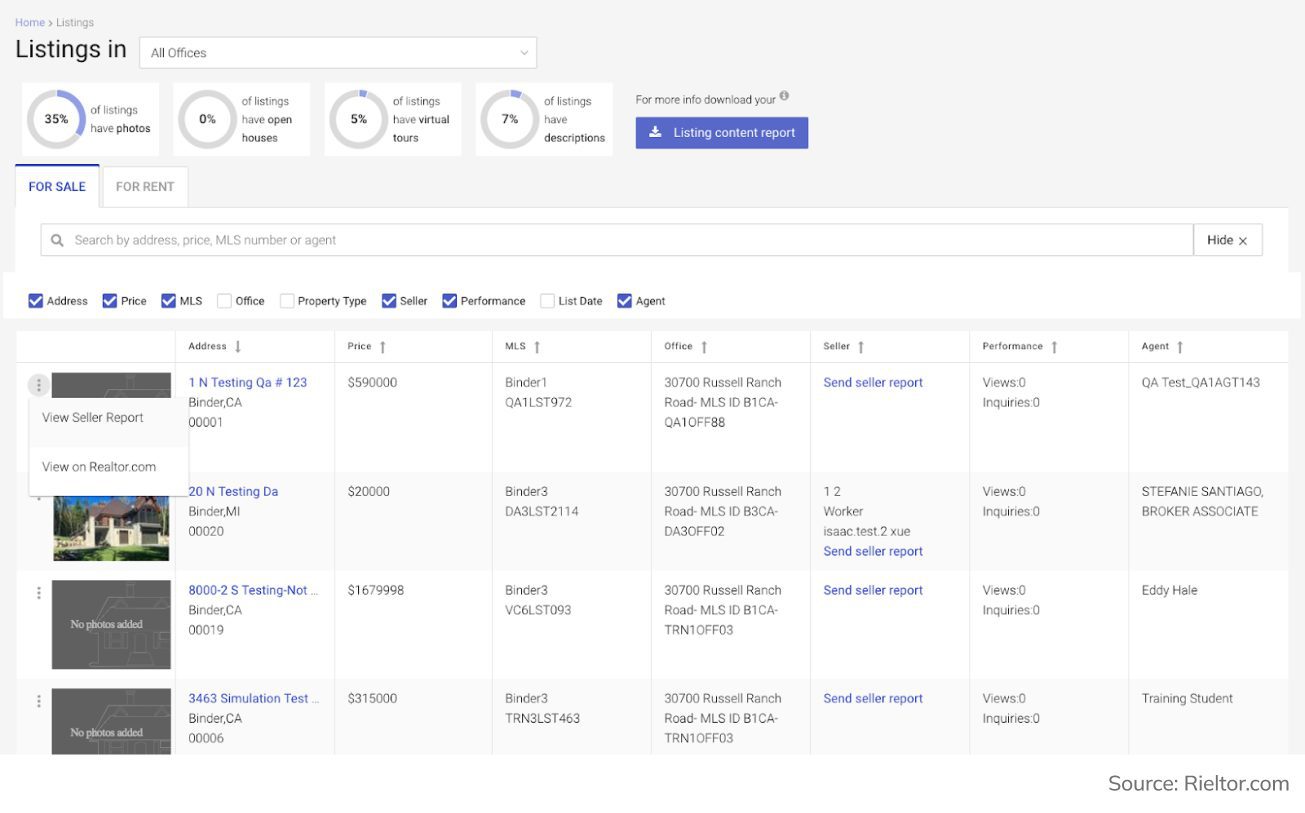
Registration. Besides a regular sign-in option, it offers an opportunity to log in through social networking or a browser.
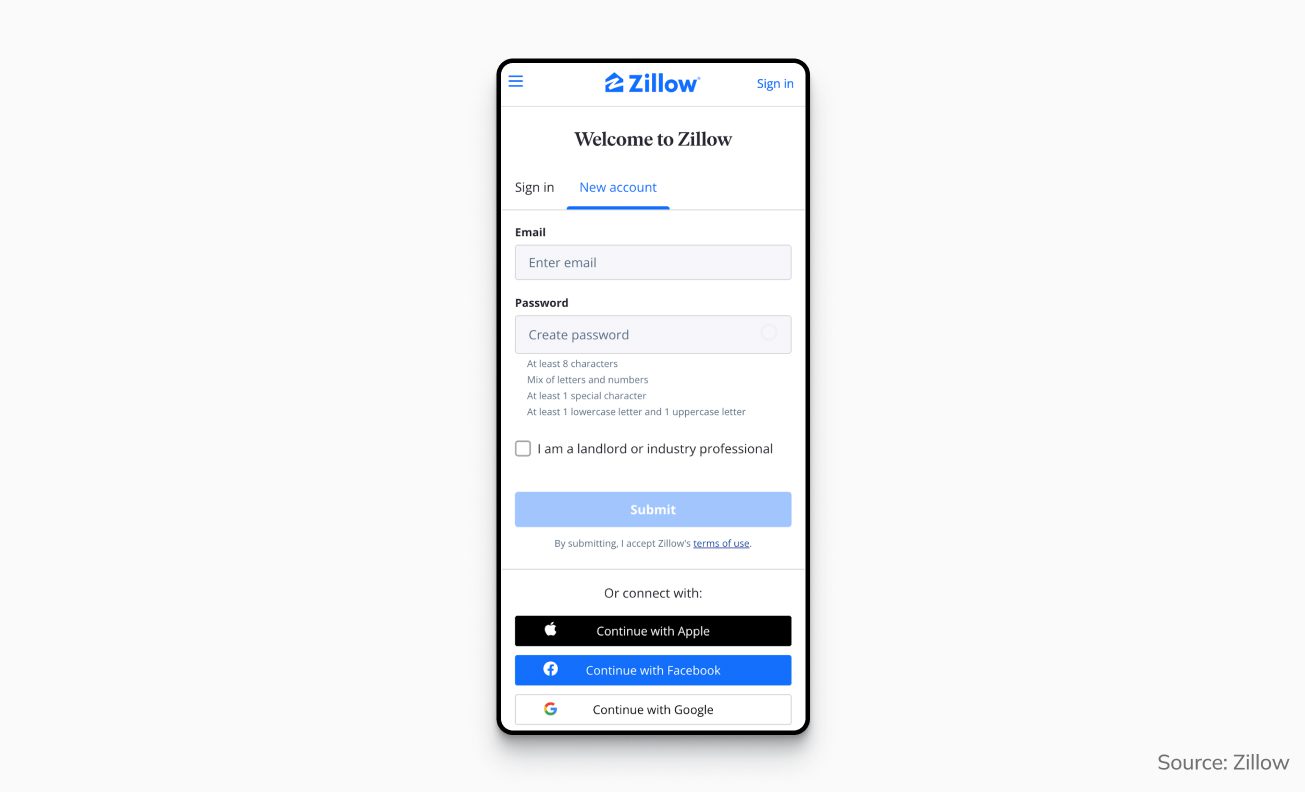
User profiles. Develop different profile types for each type of customer.
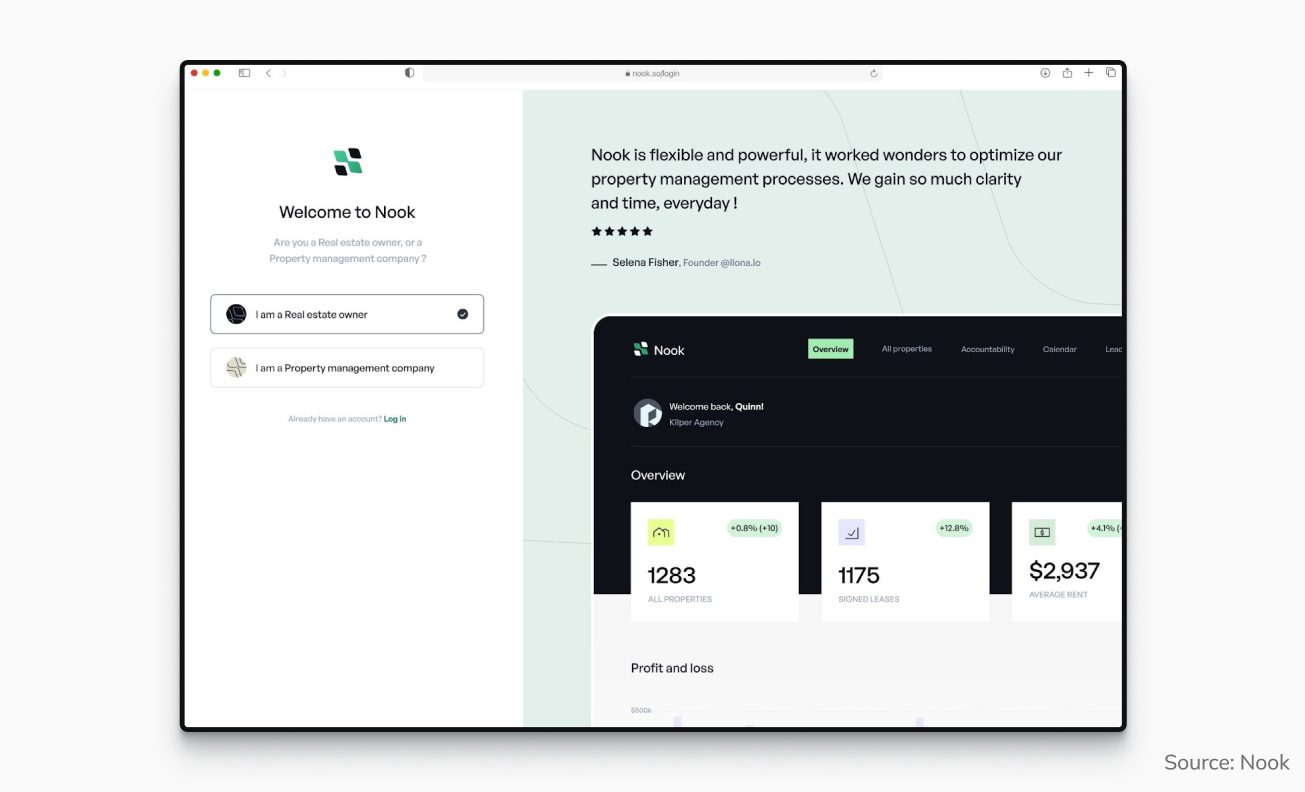
Search query. Each search feature must include such variables as location, housing type, cost, dwelling/plot area, date of construction, etc.
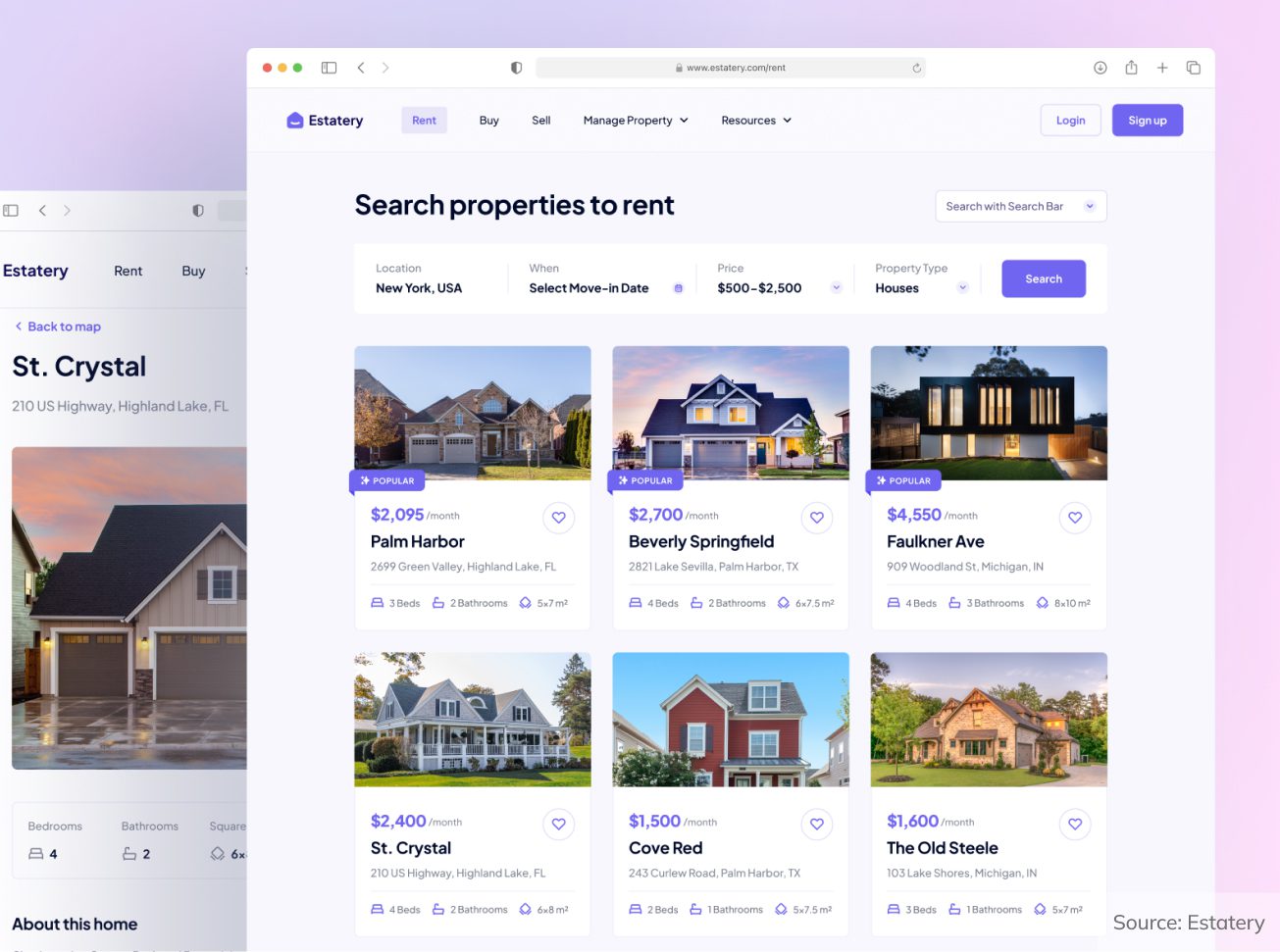
Categories and filters. This feature can make the search process easier for the user. Real estate app developers can add analytics to the prototype, and beta testers can provide feedback.
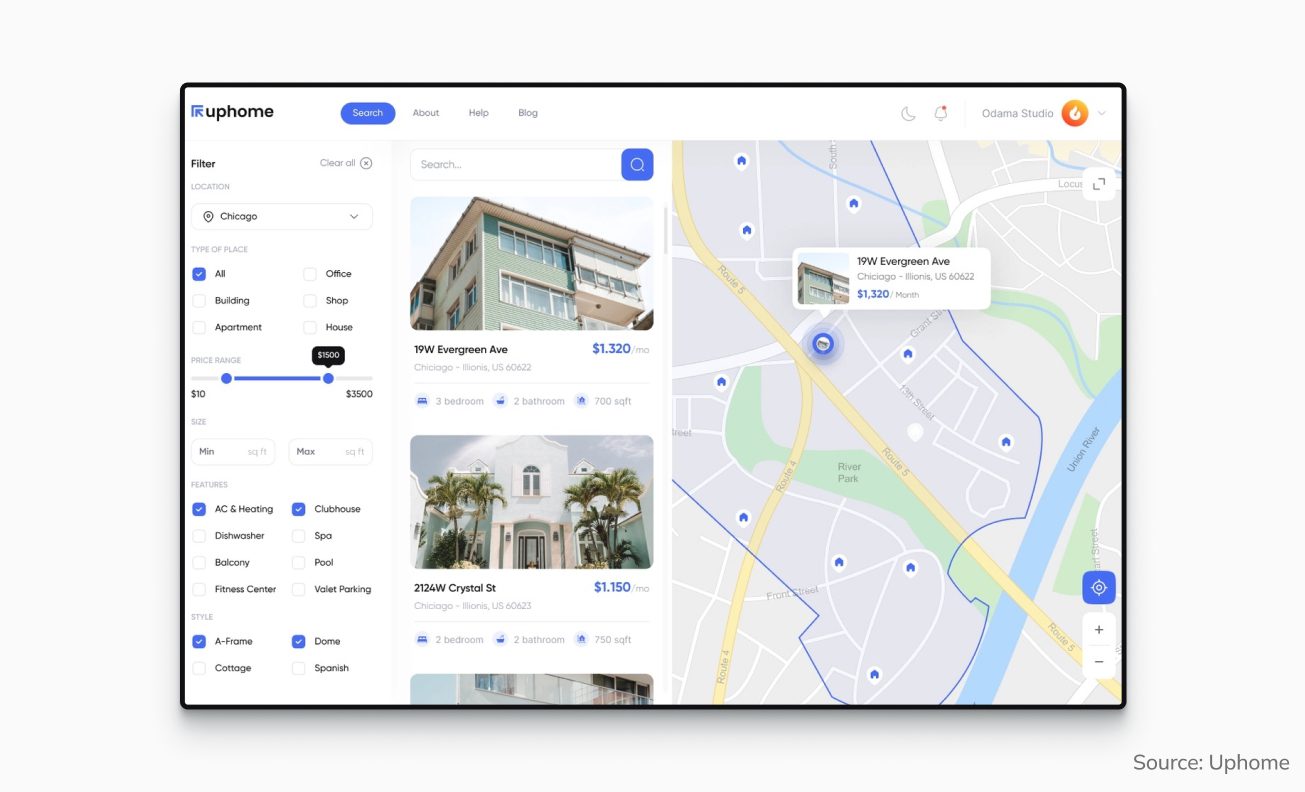
Navigation and outside view. Map integration means your app user doesn’t have to hop around apps and browsers to find the exact location of the listing. It can also help them navigate because the Smart Map can identify landmarks, famous shops, and more.
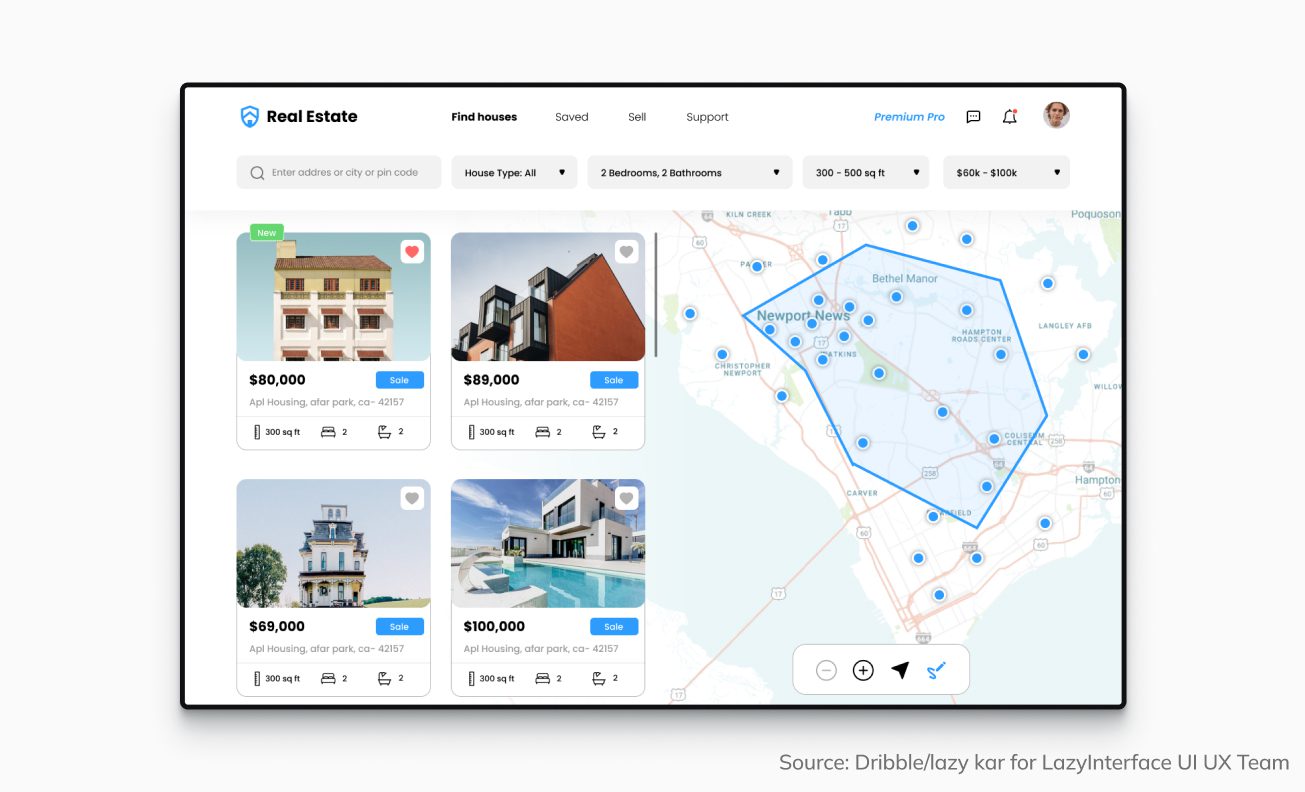
Calculator. Simplify estimate and loan rate calculations for your real estate customers using a calculator with AI and algorithms. It handles large data sets, showing loan fees, insurances, commissions, and more.
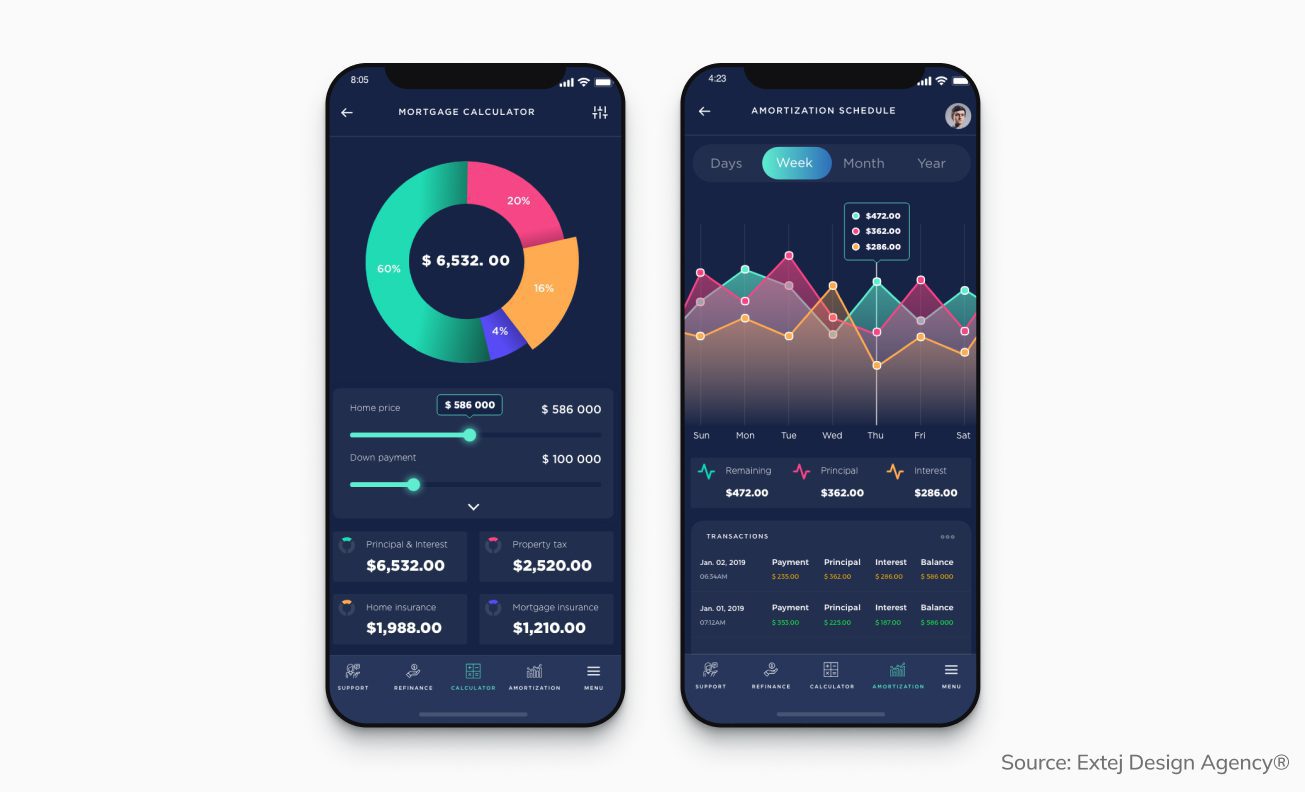
Virtual tours. Complete visualization through 3D pictures and tours around the facility. Such panorama presents the entire apartment or dwelling before visiting. Clients appreciate this option, so they often use it.
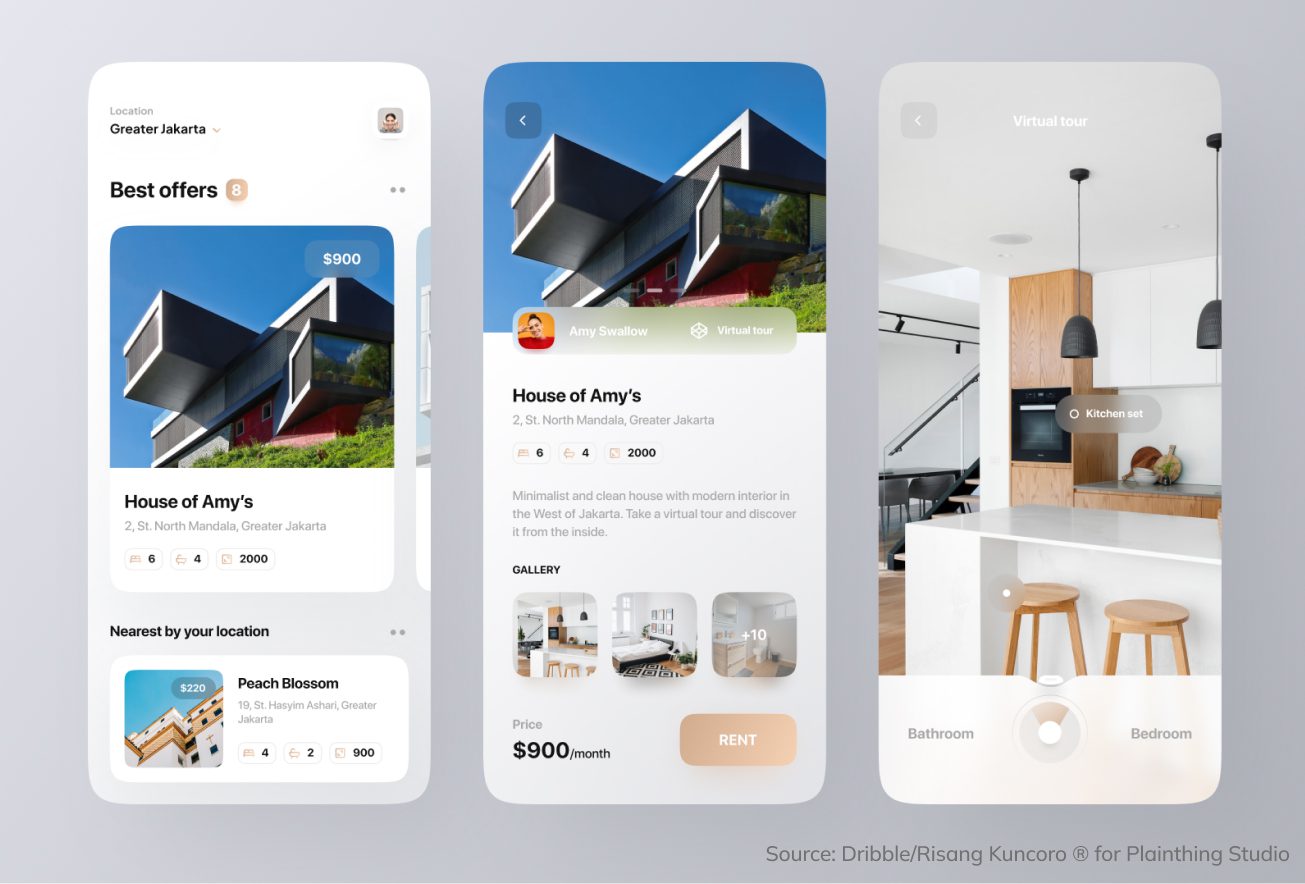
Augmented reality. AR feature allows you to design your interior virtually. Change the color of the walls, select furniture, and update the interior design.
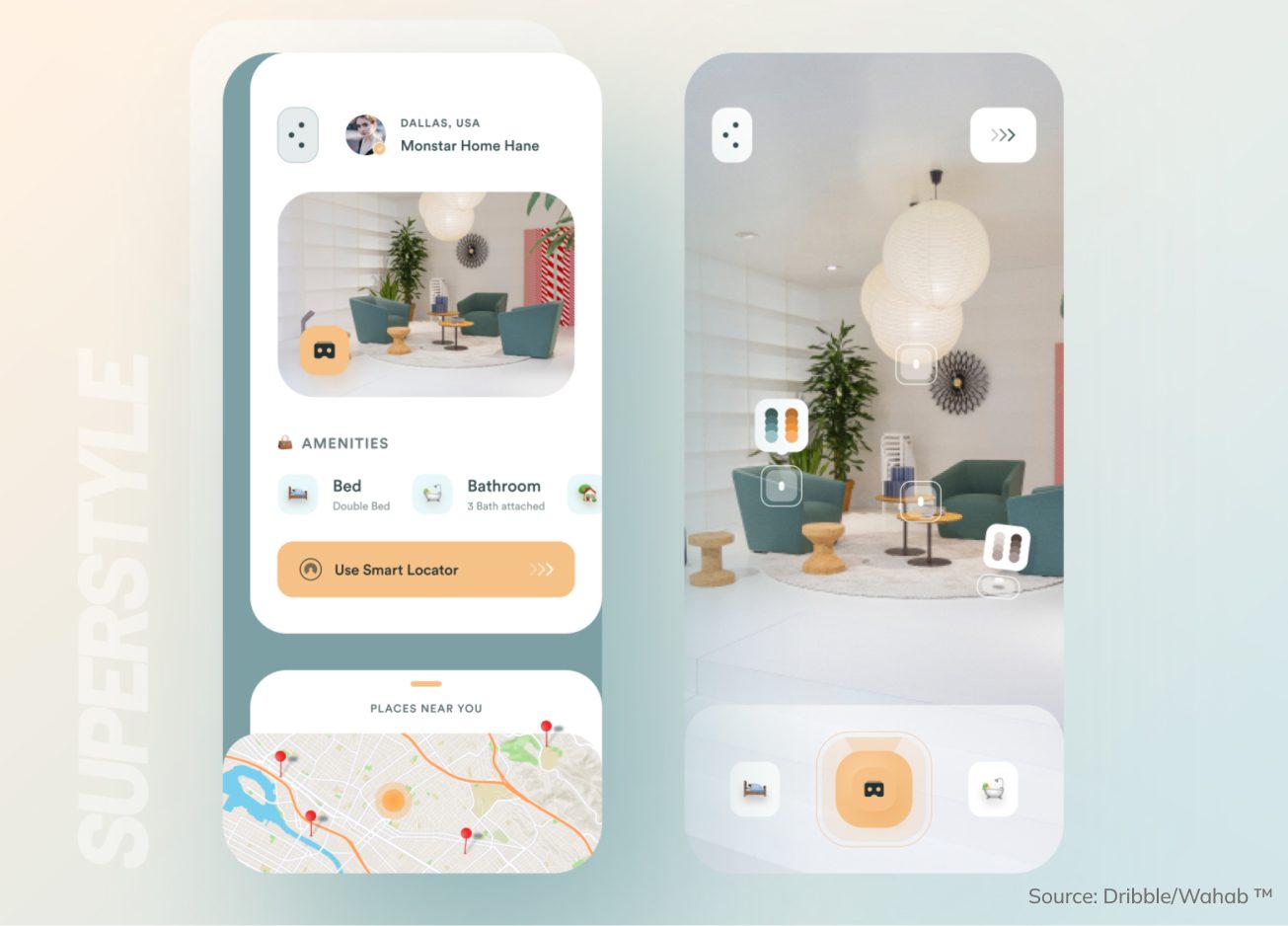
E-signature. Blockchain technology multiplies app security and offers to conclude electronic agreements and make e-payments securely.
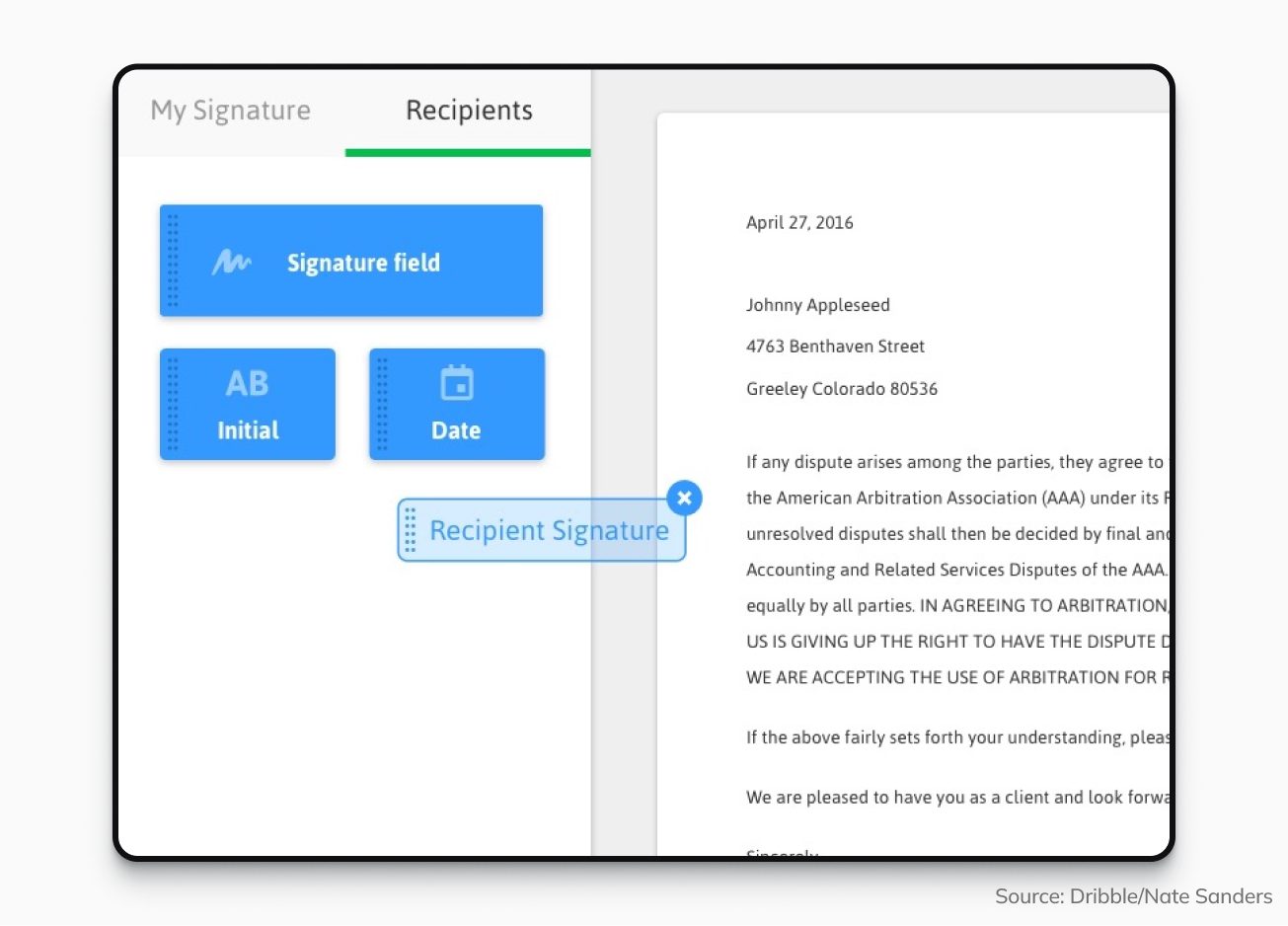
Save search results and favorites. Prepare and store your search list. Agents may discover what their customers are interested in so they can offer similar features.
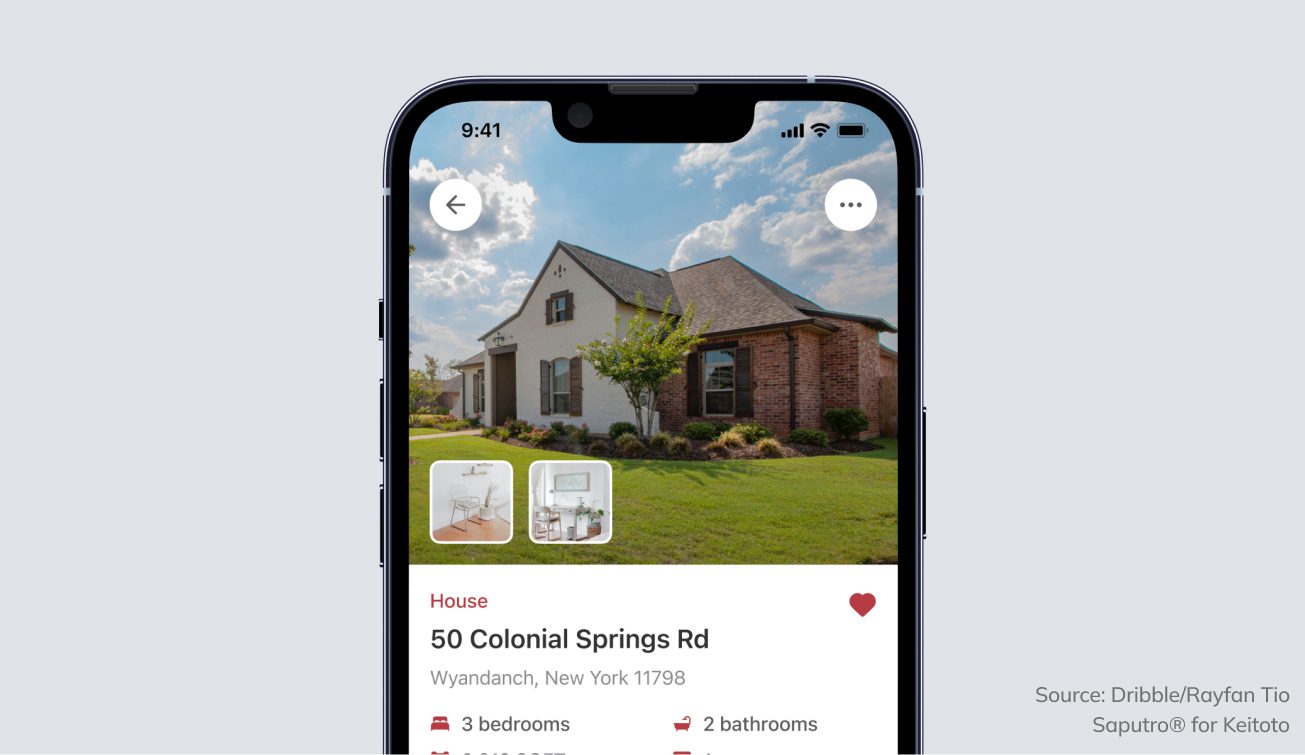
Ratings and reviews. Social proof is crucial for your audience. Real ratings and reviews of realtors, housing conditions, and neighborhoods aid user decisions. Allow users to leave reviews and scores, fostering recommendations to others.
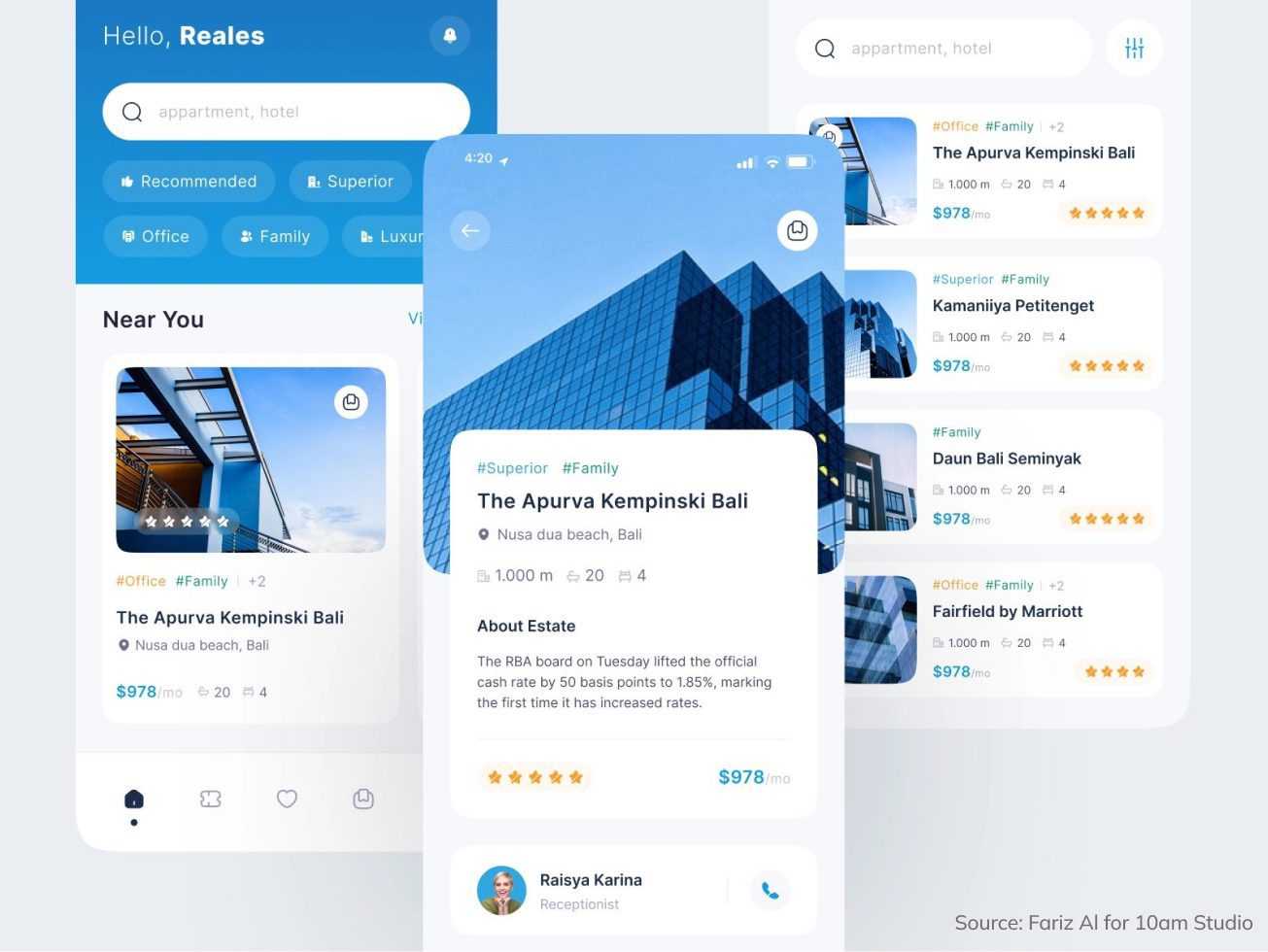
Chatbot. Chatbot provides a real-time consultation for your users, which can be reassuring and helpful with simple questions. Check the FAQ section of the guide to help you with this step of your real estate mobile app development.
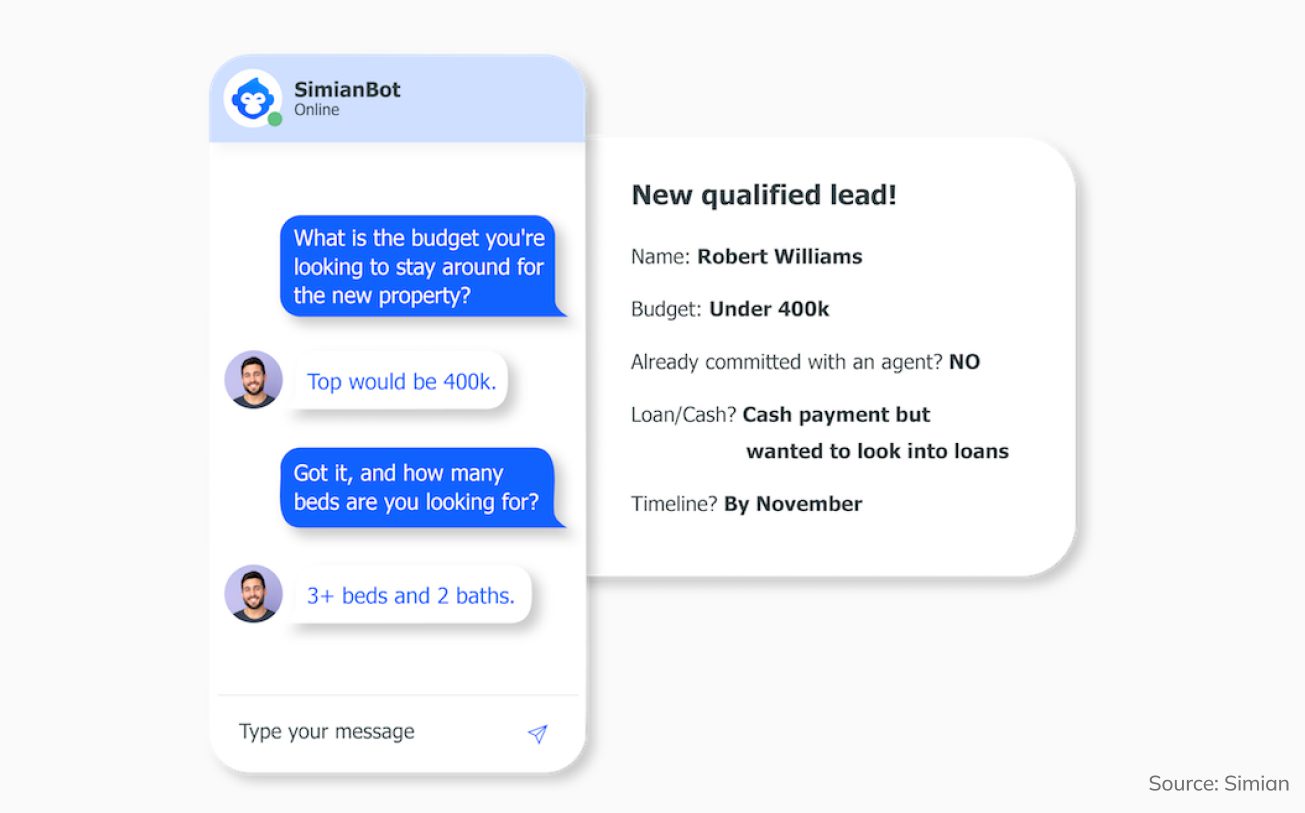
Display. Your user will analyze visual elements faster than textual descriptions, so use pictures, graphs, and charts in your listings. Information display is always more attractive and easier to grasp.
Push notifications. Your real estate app users will benefit from timely and live updates about new entries, price changes, quotations, promotions, and urgent deals.
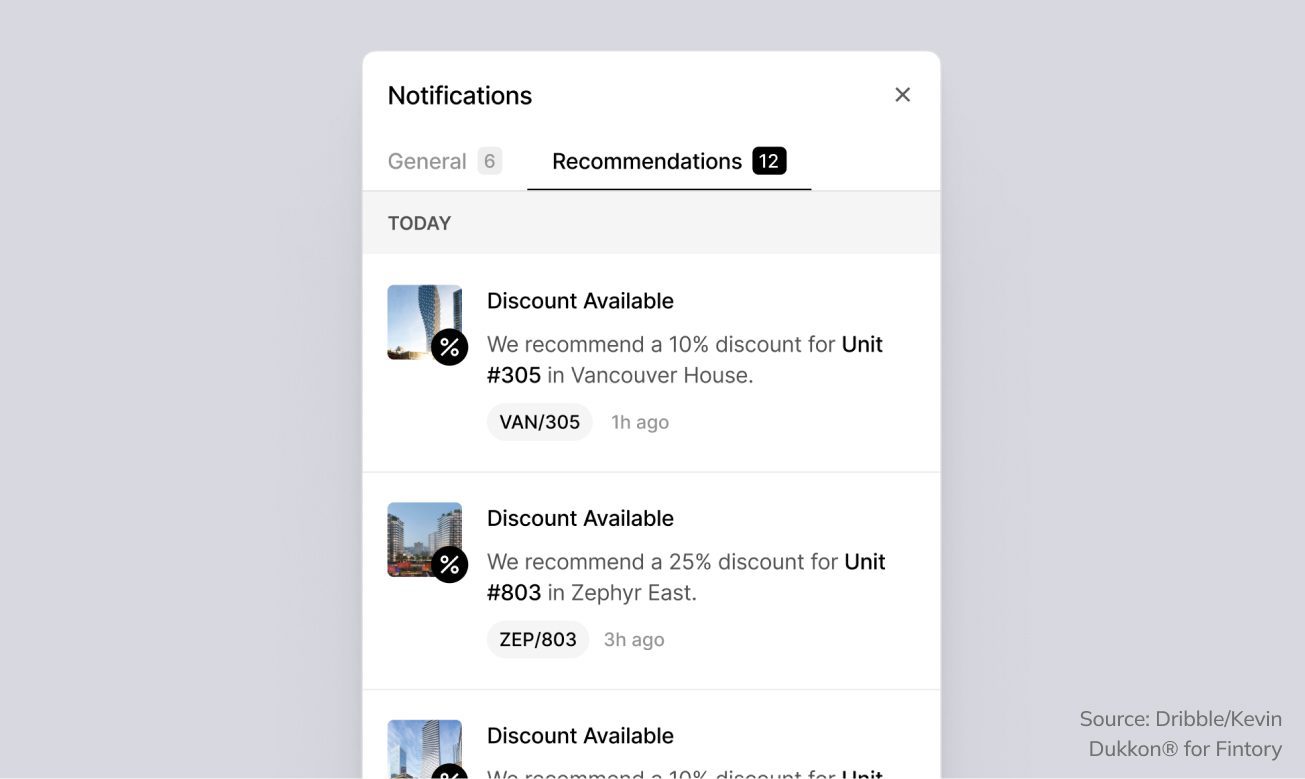
Schedule. This feature will help connect buyers and realtors more easily. They can share their schedules and book showings.
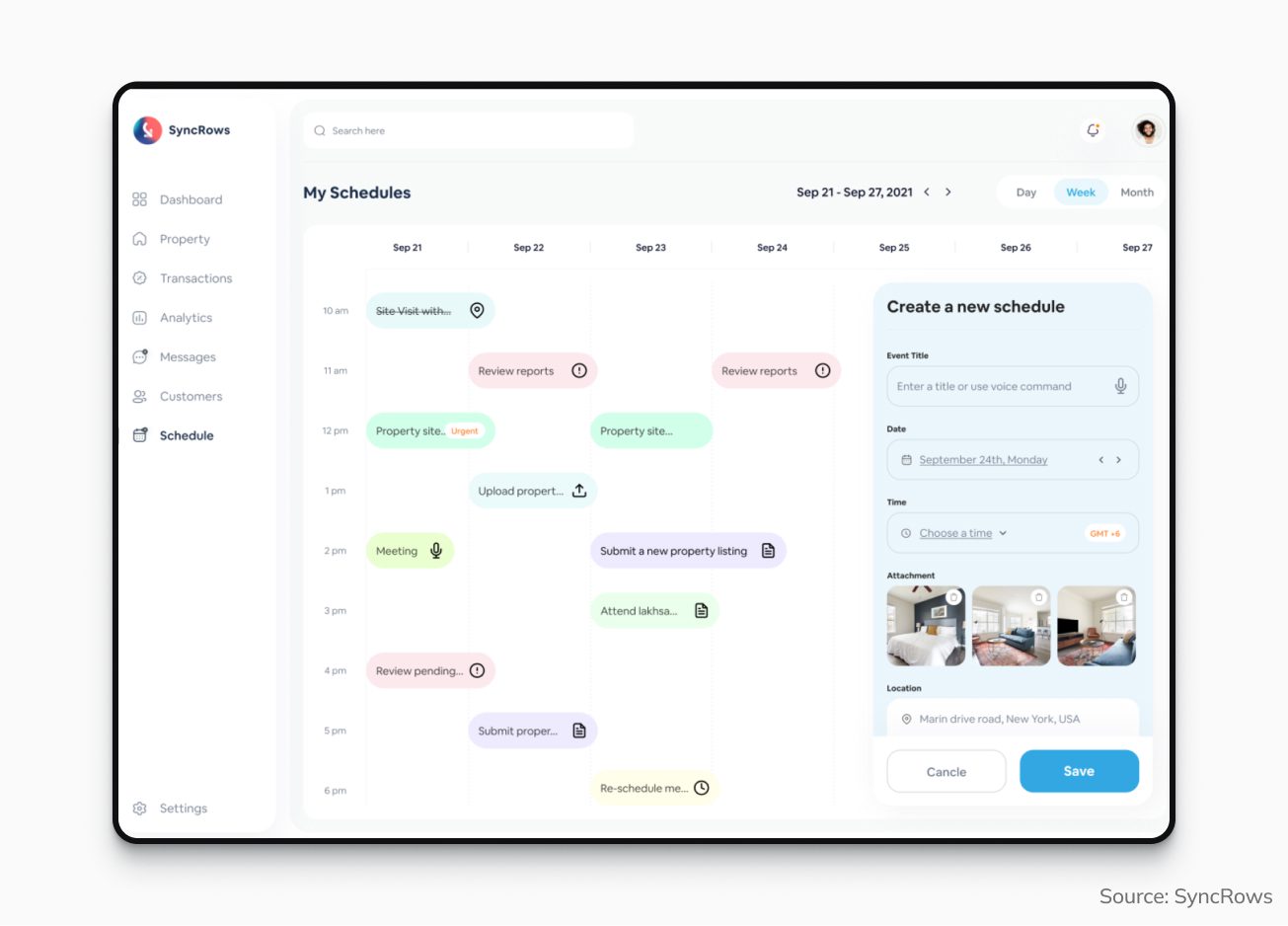
The number of features in real estate apps affects development cost directly. Each feature demands design, development, testing, and integration efforts, adding to development time and resources. More features raise app complexity, necessitating extra coding, UI/UX design, and potentially larger backend infrastructure.
| Process | Description | Cost |
| Development | The number and complexity of features will add to the price. Always consider a cross-platform solution to meet all of your customer’s needs. | $27,000 |
| UX/UI Design | Create an original design to make your app stand out on the market saturated with real estate mobile apps. | $6,000 |
| Quality Assurance | Manual and automated testing ensures the full functionality of the app. Testing the app at all stages of development will ensure efficiency. | $6,000 |
| Project Management | The project manager governs the development process and makes sure everything complies. Their fees are usually 10-15% of the overall project cost. | $5,500 |
The total cost of real estate app development depends on the app’s complexity. You’ll have to pay anywhere from $25,000 to $45,000 for a simple app. However, advanced software may cost over $70,000. You can talk to our experts and get a quote to get a specific number.
Real estate business representatives often hire an offshore team for a more cost-effective project. Hourly rates of real estate app developers vary significantly across different regions.
Experienced real estate developers in the US typically charge $100-200 per hour, varying by location and expertise. Rates in Europe range from $50-150 per hour, while in Asian countries, they are generally lower ($15 to $50 per hour). Eastern European countries like Poland, Ukraine, and Romania offer cost-effective software development with competitive rates ranging from $25 to $80 per hour, maintaining quality standards in the real estate industry.
At Glorium Technologies, we have a defined time-proven flow for implementing any project:
- Analysis and planning (discovery) – an initial point of our cooperation with the client when we investigate areas for improvement of the existing solutions or define requirements for the future solution, determine the solution plan, technical team composition, and product details.
- MVP design and development – execution of the plan developed within the discovery phase.
- Product growth – the ongoing process of the product roadmap implementation within a tight cooperation with a Product Owner.
Initially, we provide ballpark estimates for each stage so that a client can understand the lower and upper bounds of the cost. The price is adjusted throughout the project implementation based on the rates of experts involved. A client gets a detailed monthly report on project progress and precise calculations.
Anna VoznaClient Success Manager, Glorium Technologies
Hiring developers, UX designers, real estate research experts, and a project manager for app development can be exhausting, time-consuming, and costly.
Many real estate business owners hire professionals and outsource real estate mobile app development services to save time and financial resources.
Being a real estate app development company, we know the steps we need to take, how much the whole project will cost, what we must keep in mind, and more.
Overall, we follow the scrum framework for managing projects. The typical team composition is illustrated in the scheme below:
For industry-specific projects, the team always includes a superstar – an expert that has already implemented numerous projects in the respective industry and knows it inside out, which allows them to understand the business as well as a client, if not better, know in advance what pitfalls may occur and how to prevent them. Thus we ensure the highest quality of a solution delivered.Anna VoznaClient Success Manager, Glorium Technologies
For real estate app development projects, we employ a team staffed with the following professionals:
Many real estate business owners and representatives work with offshore professional teams because they trust them and their years of expertise. A reputable real estate mobile app development company can provide valuable insights, technical expertise, and tailored solutions to help bring your vision to life.
Sometimes, real estate companies will decide on self-development. This is an excellent idea if you plan to produce dozens of apps in the future. Still, if you only need one or two programs, we recommend something other than the self-development path since the potential issues can be overwhelming:
Real estate app development comes with some unique considerations and characteristics that set it apart from other types of app development. Here are a few aspects that make real estate app development unique:
Due to this unique set of requirements, you would want to look for the teams and software development engineers with experience in the relevant fields. From our experience, the best-performing set of tech stacks, languages and frameworks for real estate is as follows:
It’s important to note that the choice of programming languages and tech stacks may vary depending on the specific requirements, budget, and expertise of the development team. Working with experienced real estate app developers will help determine the most suitable technology stack for real estate app development.
To understand technology trends in the real estate industry, read our article about real estate tech trends.
We spent over a decade working in the real estate industry, creating successful software and apps for our customers. Vast experience with the industry-relevant tech stack and regulations allows us to plan and deliver projects smoothly and efficiently. We can give you realistic timelines and budget estimations and share the best real estate app development practices.
Take a look at some of the real estate app development services and products delivered by Glorium Technology engineers:
Traditional advertising
Using traditional ads is an easy way to make money by placing ads on your platform. However, it’s best not to overload with ads to keep potential customers interested.
Freemium model
The free version includes basic real estate application features with ads. Users wanting advanced features can buy the ad-free premium version.
Professional promotion
Real estate agents and realtors use this model. They promote their business by searching for potential clients for a fixed amount. Thus, the ads will be visible only to users willing to pay.
Service models
This model supposes that the company provides various services for complete apartment support throughout the rental period. Owners can select from different support packages, covering tenant due diligence, cleaning, repairs, insurance, utility bills, etc. Tenants are billed a monthly fee of 5-10% of the monthly rent for extra amenities.
After you successfully develop a real estate mobile app, it’s time to launch it and get ready for the downloads.
Soft launch involves releasing the app to a limited audience. It allows developers to gather feedback, test functionalities, and identify potential issues. After this, you can make necessary adjustments before rolling out your real estate mobile app to a broader audience.
ASO – App Store Optimization is a set of methods aimed at ranking your real estate mobile app higher. Here are ASO principles that can help you boost your app:
Create separate social channels to get more reviews and improve your image (and SEO indicators). With social media playing a key role in brand credibility especially on visual platforms like Instagram some businesses also choose to buy Instagram followers to jumpstart engagement and strengthen their online presence. You define the exact list in the market analysis step.
The media, prominent bloggers, and news websites might attract attention to your app. For example, your project is top on a specialized and respected website. Here, you can be sure about future visits and downloads.
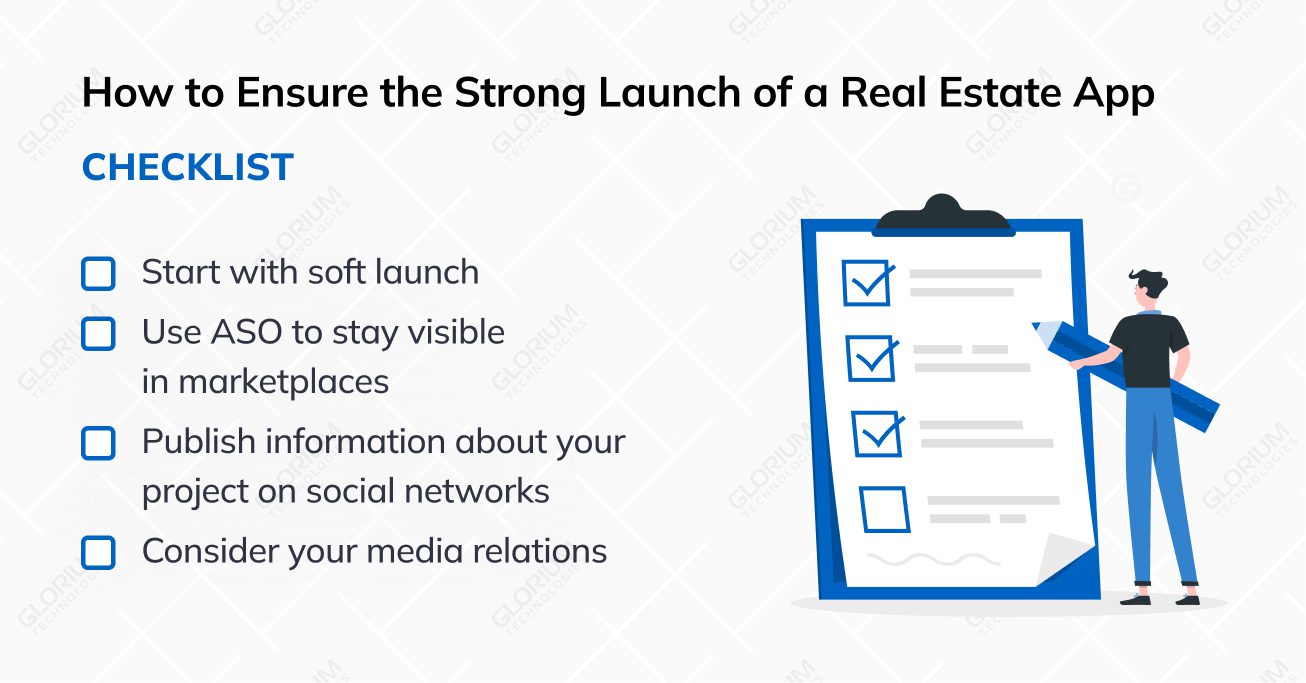
Developing a real estate mobile app takes time and precision. We recommend hiring a professional team that can guarantee successful real estate software development.
Our team starts with a preliminary prediction of the client’s return on investment and guides you through to the final point. We stick to the General Data Protection Regulation (GDPR) and make sure we comply with the law so that our apps are secure and ready to use anytime, anywhere.
Keep up with the competition! Contact us now and put your solution on AppStore or Google Play as soon as in a few months.
The real estate app development cost can vary depending on factors such as app complexity, features, platform, design requirements, and development time. Consult with a professional real estate mobile app development company to get a detailed cost estimate based on your specific needs.
Real estate app development typically involves technologies such as mobile app development frameworks, programming languages, cloud storage for property data, APIs for integration with maps and other services, and technologies like augmented reality (AR) for virtual property tours.
A real estate mobile app should include essential features such as property listings with detailed information, high-quality images, search filters, saved searches, favorites lists, virtual property tours, mortgage calculators, contact forms, push notifications, and integration with maps for easy navigation.
The development time for a real estate app can vary depending on the complexity of the project and the desired features. Developing simple apps takes 3-6 months, while more complex solutions take 9-12 months.
Yes, integrating third-party services can enhance the functionality of your real estate app. Common integrations include maps, payment gateways, property data providers, customer relationship management (CRM) systems, and analytics platforms.
Choosing the right development team is crucial for a successful real estate app development. Consider factors such as the team’s experience in app development, expertise in real estate development specifically, portfolio of past projects, client testimonials, communication skills, ability to meet deadlines, and the availability of ongoing support and maintenance services.
